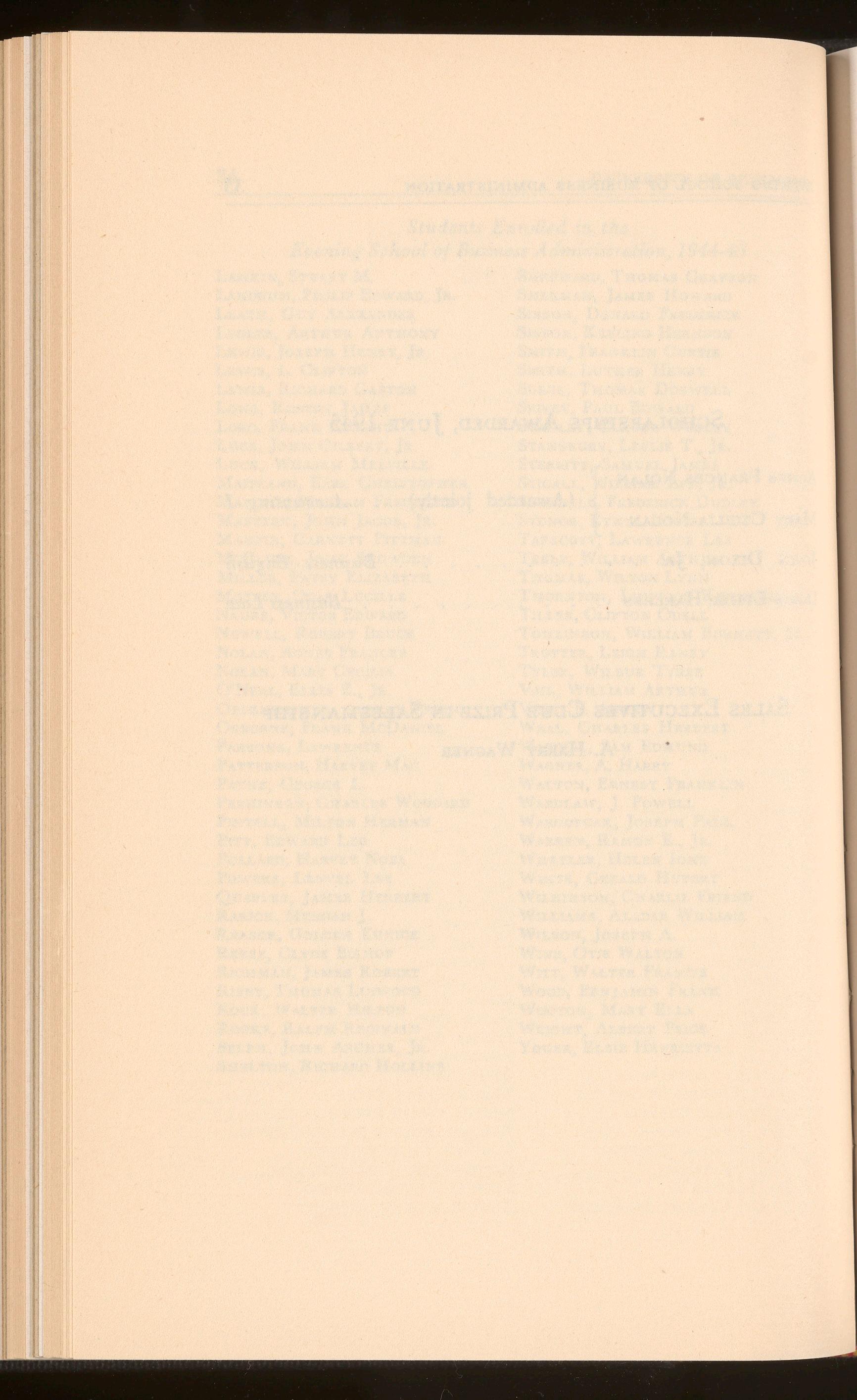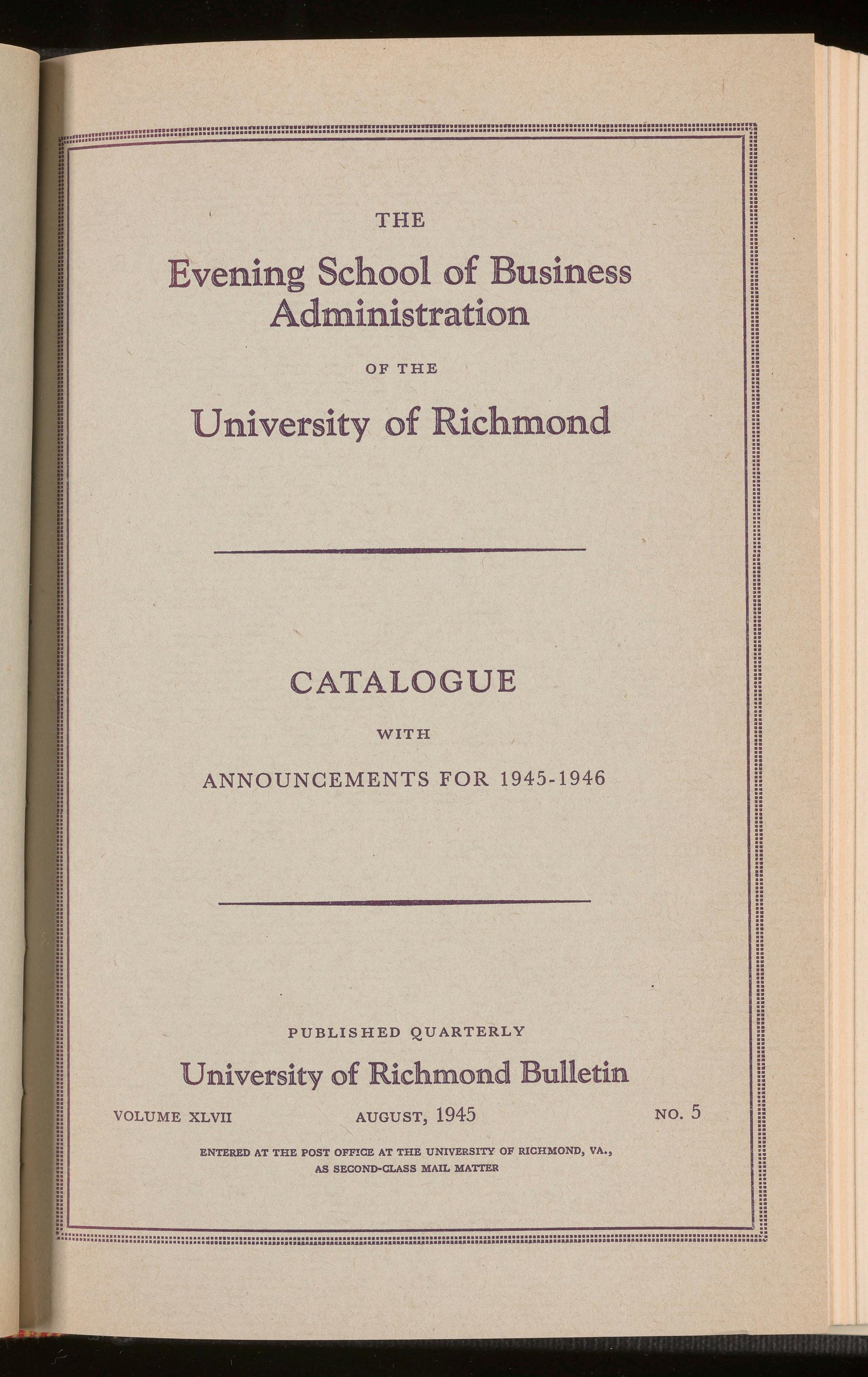


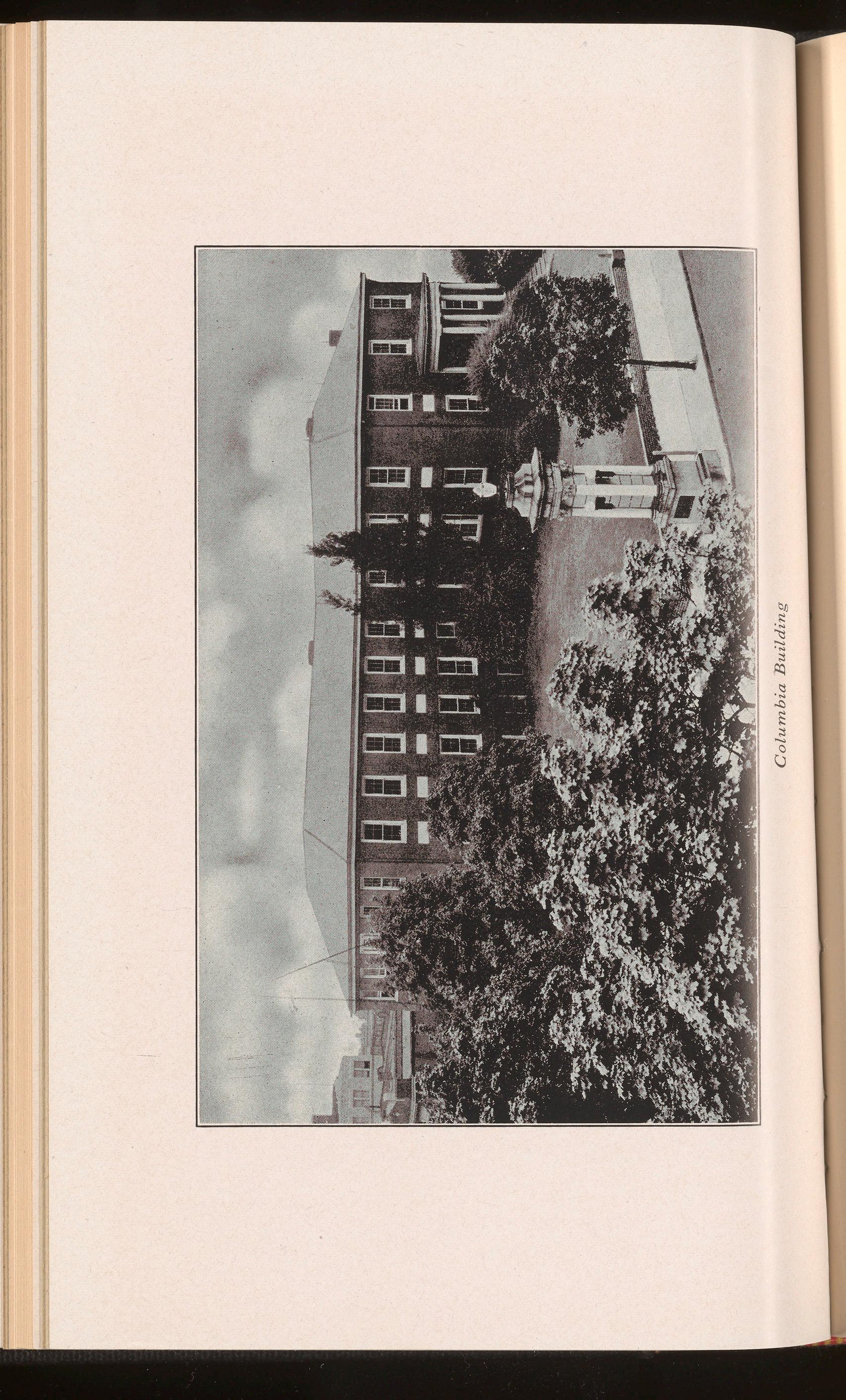





WI TH ANNOUNCEMENTS FOR 194 5 -1946
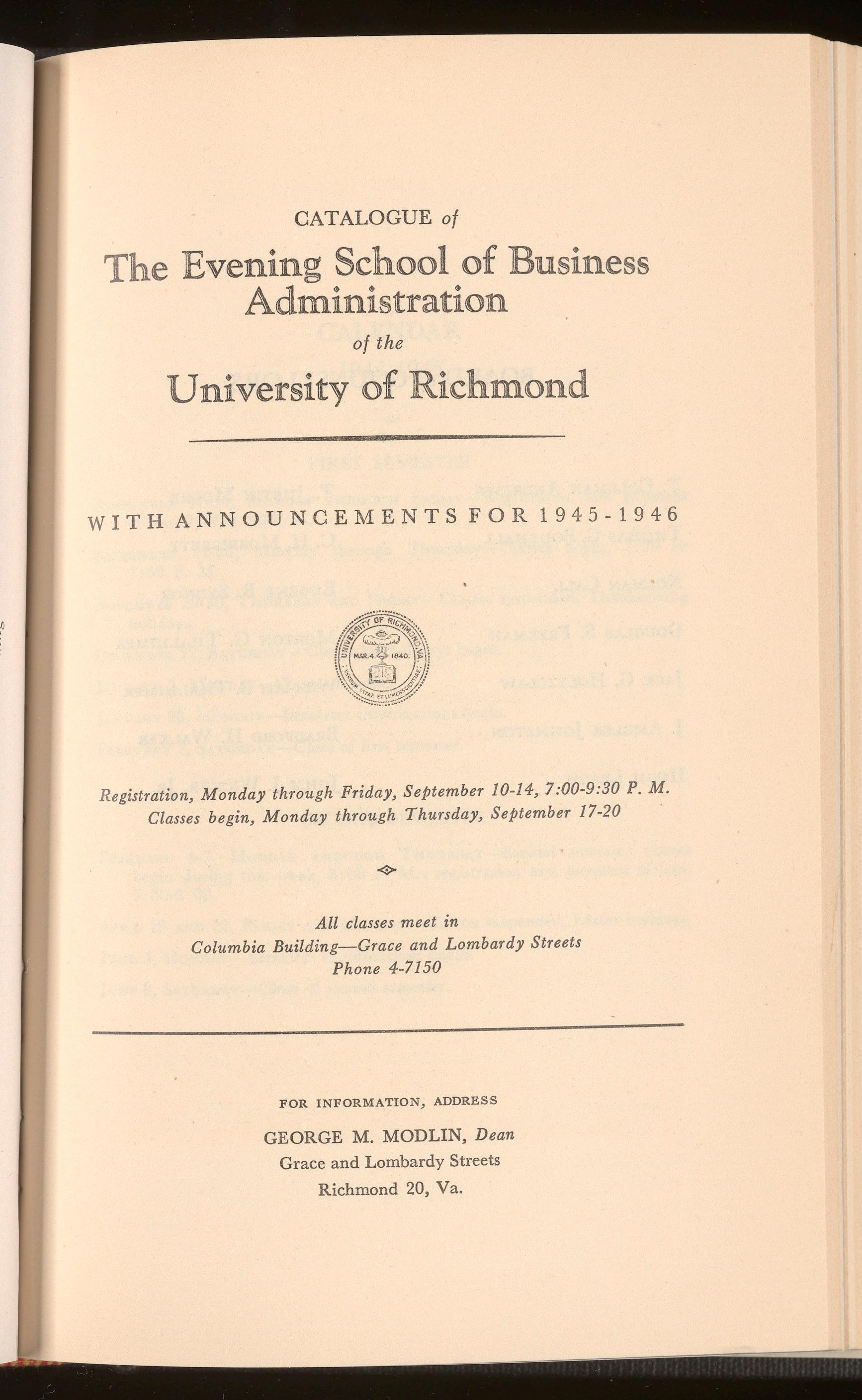
Regi stration, Monday through Friday, September 10-14, 7:00-9:30 P. M . Classes begin, Monday through Thursday , September 17-20
All classes meet in Columbia Building-Grace and Lombardy Streets Phone 4-7150 FOR INFORMATION, ADDRESS
GEORGE M. MODLIN, Dean Grace and Lombardy Streets
Richmond 20, Va.
T. COLEMAN ANDREWS
THOMAS C. BousHALL
NORMAN CALL
DOUGLAS S. FREEMAN
JACK G . HOLTZCLAW
J. AMBLER JOHNSTON
HUGH LEACH

T. JUSTIN MOORE
C. H. MoRRISSETT
EUGENE B. SYDNOR
MORTON G. THALHIME R
WILLIAM B. THALHIMER
BRADFORD H. w ALKER
JOHN J. WICKER, JR.
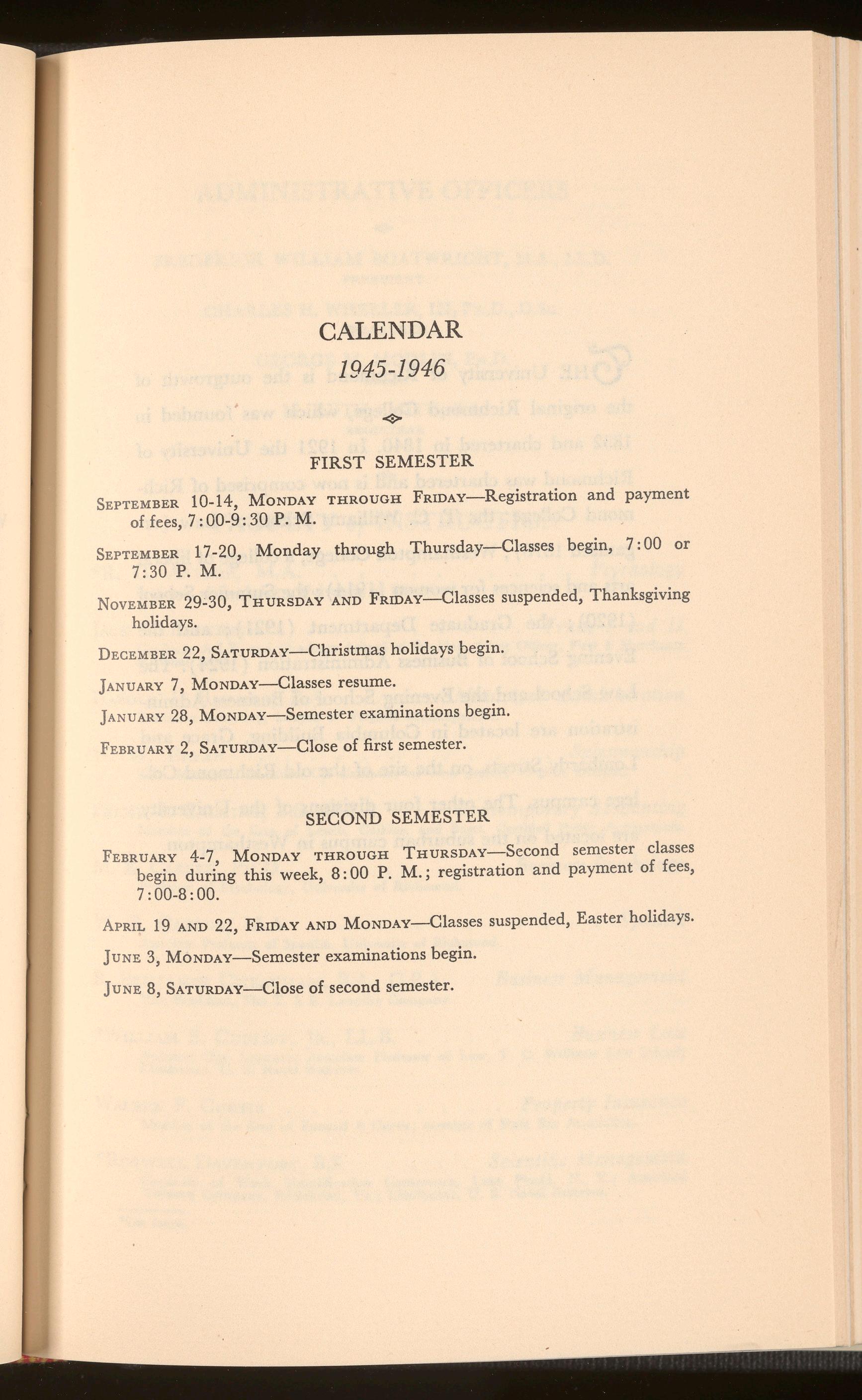
SEPTEMBER 10-14, MoNDAY THROUGH FRIDAY-Registration and payment of fe es, 7 : 00-9: 30 P. M.
SEPTEMBER 17-20, Monday through Thursday-Classes begin, 7: 00 or 7 : 30 P M.
NOVEMBER 29-30, THURSDAY AND FRIDAY-Classes suspended, Thanksgiving ho lidays.
DECEMBER 22, SATURDAY-Christmas holidays begin.
JANUARY 7, MONDAY-Classes resume
JANUARY28, MoNDAY-Semester examinations begin.
FEBRUAR Y 2, SATURDAY-Close of first semester.
FEBRUARY 4-7, MONDAY THROUGH THURSDAY-S econd semester class es b egin during this week, 8: 00 P. M ; registration and paym ent of fees, 7 : 00-8:00.
APRIL 19 AND 22, FRIDAYAND MoNDAY-Classes suspended, Easter holid a ys.
JUNE 3, MONDAY-Semester examinations begin .
JUNE 8, SATURDAY-Close of second semester.
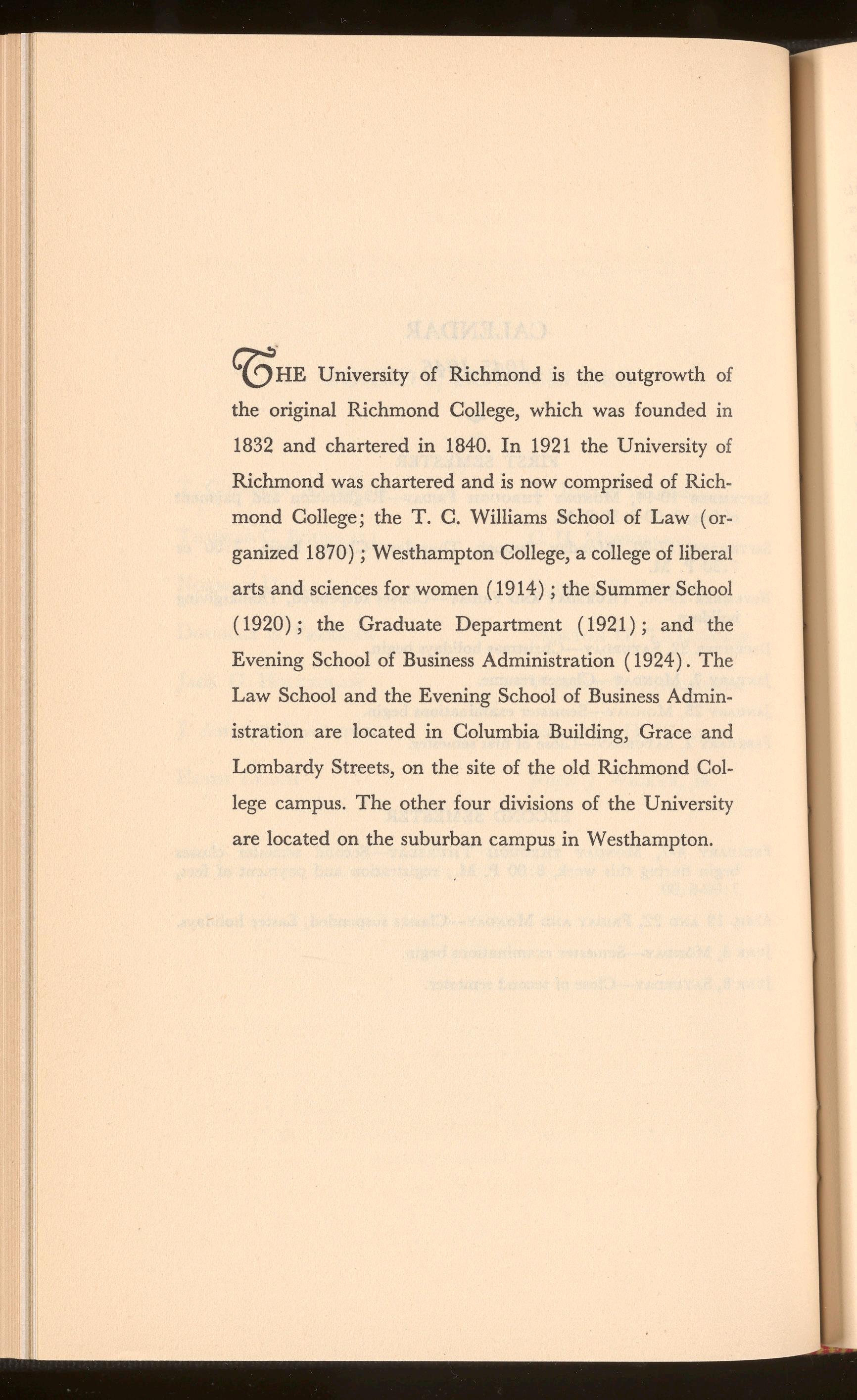
~HE University of Richmond is the outgrowth of the original Richmond College, which was founded in 1832 and chartered in 1840. In 1921 the University of Richmond was chartered and is now comprised of Richmond College; the T. C. Williams School of Law (organized 1870); Westhampton College, a college of liberal arts and sciences for women ( 1914) ; the Summer School ( 1920); the Graduate Department ( 1921); and the Evening School of Business Administration ( 1924). The Law School and the Evening School of Business Administration are located in Columbia Building, Grace and Lombardy Streets, on the site of the old Richmond College campus. The other four divisions of the University are located on the suburban campus in Westhampton.
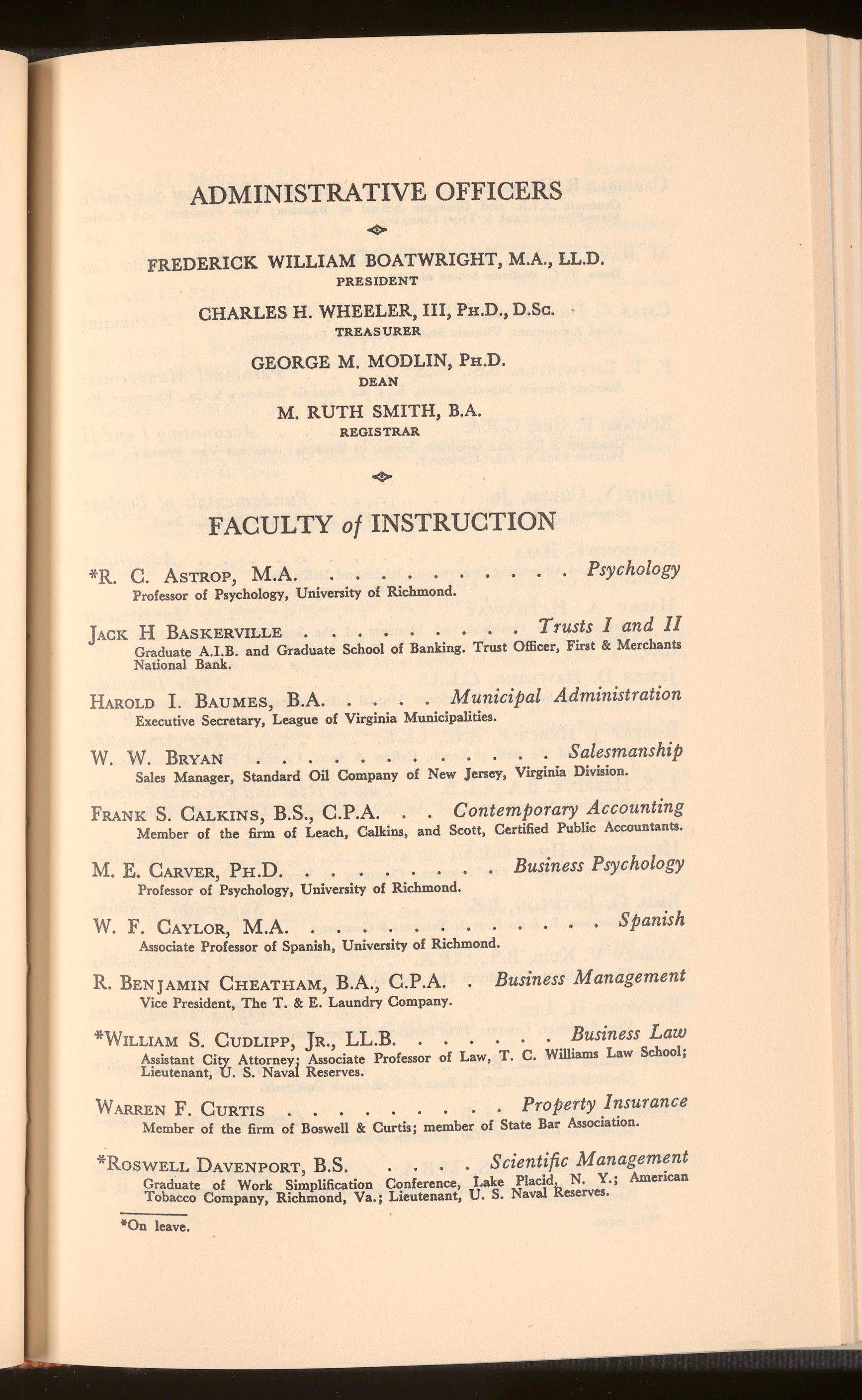
FREDERICK WILLIAM BOATWRIGHT, M.A., LL.D. PRESIDENT
CHARLES H. WHEELER, III, PH.D., D.Sc. TREASURER
GEORGE M. MODLIN, PH.D. DEAN
M. RUTH SMITH, B.A. REGISTRAR
*R. C. AsTROP, M.A. Psychology Professor of Psychology, Univenity of Richmond.
JACK H BASKERVILLE Trusts I and II
Grad uate A.LB and Graduate School of Banking. Trust Officer, Fint & Merchants Na tional Bank.
HAROL D I. BAUMES, B.A . Municipal Administration Executive Secretary, League of Virginia Municipalities
W. W. BRYAN Salesmanship Sales Manager, Standard Oil Company of New Jersey, Virginia Division.
FRANKS. CALKINS, B.S., C.P.A. Contemporary Accounting Member of the firm of Leach, Calkins, and Scott, Certified Public Accountants
M. E CARVER,PH.D. Business Psychology Professor of Psychology, Univenity of Richmond.
W. F. CAYLOR,M.A. Spanish Associate Professor of Spanish, Univenity of Richmond
R. BENJAMIN CHEATHAM,B.A., C.P .A. Vice President, The T & E. Laundry Company Business Management
*WILLIAMS. CuDLIPP, JR., LL.B. . . • • . . Business Law ,½sistant City Attorneyf· Associate Professor of Law, T. C Williams Law School; Lieutenant, U. S. Nava Reserves.
WARRENF. CURTIS . . • . . . . . . Property Insurance Member of the firm of Boswell & Curtis; member of State Bar Association
*Ros w ELL DAVENPORT,B.S. • . • • Scientific Management G Traduate of Work Simplification Conference, Lake Placid~ N Y.; American obacco Company, Richmond, Va.; Lieutenant , U. S. Naval Keserves --" On leave.
CARLISLE R. : DAVIS

Analyzing Financial Stat ements
Graduate A.I.B. and Graduate School of Banking; Vice President and Cashier, State-Planters Bank & Trust Company,
M. R.w DouBLEs, B.S., LL.B., J.D.
Administrativ e Law Dean, T. C. Williams School of Law.
CHAS. C. DRUMMOND
Chief Accountant, Virginia State Corporation Commission. Acco unting
F. T. ENTWISTLE, B.S., M.S.
Personnel Mana gement Assistant Service Superintendent, E. I. du Pont de Nemours & Co., Richm ond, Va,
EDWARD F. GEE, C.P.A.
Accounting I and II
Graduate A.I.B and Graduate School of Banking; Assistant Vice Preside nt, StatePlanters Bank & Trust Company.
JoHN Y. GREEN, JR.
Fundamentals of Ba nking
Graduate A. I. B.; Assistant Auditor, First & Merchants National Bank
RAYMOND C. HALL Adv ertising Sales and Advertising Department, Richmond Dairy Co.
HARRY A. HATHAWAY Inves tments
Assistant Vice President and Manager of the Securities Division, Stat e-Planten Bank & Trust Company.
JAMES D. HAWKINS, C.L.U.
Life Ins urance Production Supervisor, Provident Mutual Life Insurance Co , Richmond , Va.
ROBERT J. HEBERLE, A.B., LL.B.
Tax Acco unting Member of the staff of Leach, Calkins & Scott, Certified Public Accounta nts.
L. S. HERRINK, B.A., LL.B. Law of Real and Personal Pr operty Practicing Attorney at Law; Associate Professor of Law, T. C. Williams Law School.
HERBERT R. HILL, C.L.U. Ins urance District Manager, Life Insurance Company of Virginia, Richmond, Va.
EMIL 0. JOHNSON, B.S. Supervisor Tr aining Supervisor, E . I. du Pont de Nemours & Company.
AUBREY V. KrnD, B.S., C.P.A. Acco unting Vice President, The Morris Plan Bank of Virginia.
RAYMOND H. LEE Office Manag ement Vice President, Lawyers Title Insurance Corporation.
ST. GEORGE T. LEE, B.A. Wark Simplifi cation Methods Engineer, E. I. du Pont de Nemours & Company.
JOHN G. MAY, JR., LL.B. Casualty Insuranc e Law Member of the firm of May, Simpkins & Young.
*F; BYERS MILLER, B.S., M.B.A. • • • Corporation Fin ance Associate Professor of Applied Economics, University of Richmond; Ensign, U. S. Naval Reserves. · *On leave.
G EORGE M. MoDLIN, PH.D.
Economics Dean, Evening School of Business Administration, University of Richmond.
*W. F . PAYNE, B.S ., C.P.A.
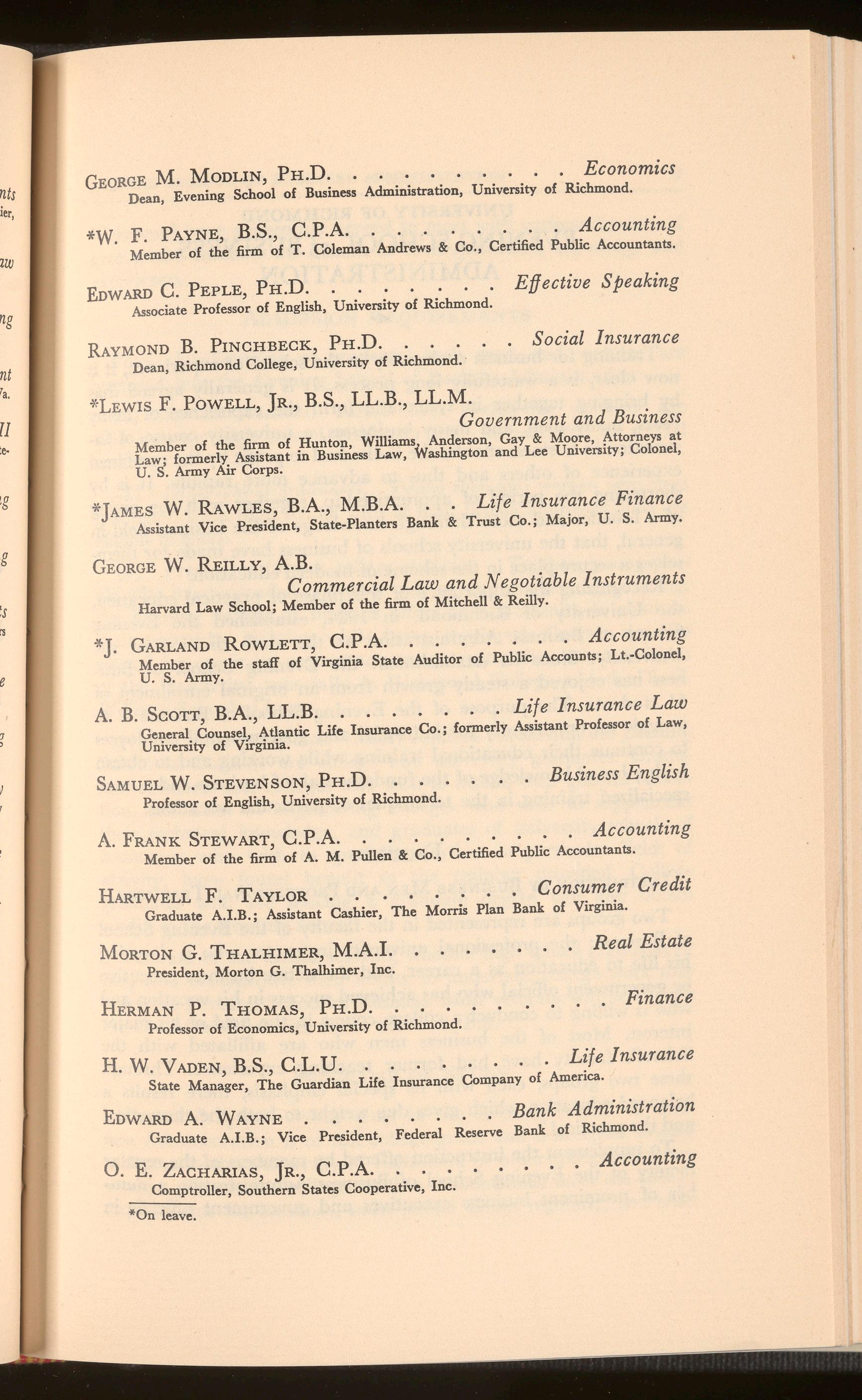
Accounting
Member of the firm of T. Coleman Andrews & Co., Certified Public Accountants.
E DWARD C PEPLE, PH.D.
Associate Professor of English, University of Richmond.
RAYMON D B. PINCHBECK, PH D.
Effective Speaking
Social Insurance Dean, Richmond College, University of Richmond.
*LEWIS F . PowELL, JR., B.S , LL.B., LL.M. Government and Business
Member of the firm of Hunton, Williams Anderson, Gay & Moore, Attorneys at Law; formerly Assistant in Business Law, Washington and Lee University; Colonel, U. S. Army Air Corps.
*JAMES W. RAWLES, B.A., M.B.A. Life Insurance Finance
Assistant Vice President, State -Planters Bank & Trust Co.; Major, U. S Army.
GEORGE w. REILLY, A.B.Commercial Law and Negotiable Instruments
Harv ard Law School; Member of the firm of Mitchell & Reilly
*J. GA RLAND RowLETT, C.P.A.
Accounting Member of the staff of Virginia State Auditor of Public Accounts; Lt -Colonel, u . s. Army.
A. B. ScoTT, B.A., LL.B . • Life Insurance Law General Counsel, Atlantic Life Insurance Co ; formerly Assistant Professor of Law , U niversity of Virginia.
Business En glish
SAMUE L w . STEVENSON, PH.D. Professor of English, University of Richmond.
A. FRA NK STEWART, C.P.A.
Accounting Member of the firm of A M. Pullen & Co., Certified Public Accountants.
HAR T W ELL F. TAYLOR
Consumer Credit Graduate A.I.B.; Assistant Cashier, The Morris Plan Bank of Virgin ia.
MORT ON G. THALHIMER, M.A.I.
Real Estate President, Morton G. Thalhimer, Inc.
Finance
HERM AN P. THOMAS, PH.D. Professor of Economics, University of Richmond
H. W. VADEN, B.S., C.L.U.
Life Insurance State Manager, The Guardian Life Insurance Company of America
Bank Administration
EDWA RD A w AYNE
Graduate A.I.B.; Vice President, Federal Reserve Bank of Richmond.
Accounting
0. E ZACHARIAS, JR., C.P A. • • • Comptroller, Southern States Cooperative, Inc.
*On leave
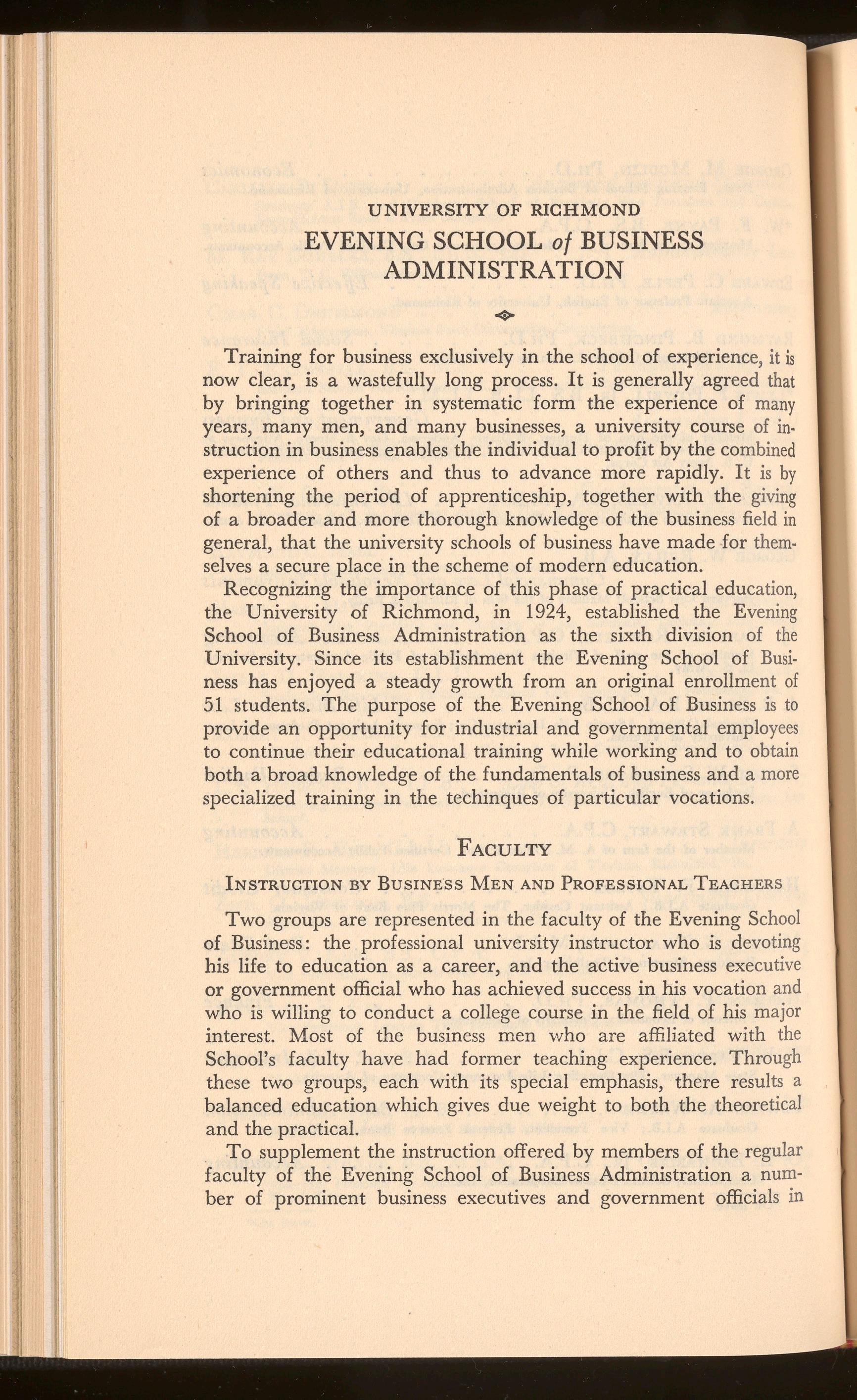
Training for business exclusively in the school of experie nce, it is now clear, is a wastefully long process. It is generally agr eed that by bringing together in systematic form the experience of many years, many men, and many businesses, a university course of instruction in business enables the individual to profit by the combined experience of others and thus to advance more rapidly. I t is by shortening the period of apprenticeship, together with the giving of a broader and more thorough knowl edge of the business field in general, th a t the university schools of busines s have made for themselves a secure place in the scheme of modern education.
Recognizing the importance of this phase of practical edu cation, the University of Richmond, in 1924, established th e E vening School of Business Administration as the sixth division of the University . Since its establishment the Ev ening School of Business has enjoyed a steady growth from an original enroll ment of 51 students The purpose of the Evening School of Busin ess is to provide an opportunity for industrial and governmental emp loyees to continue their educational training while working and to obtain both a broad knowledge of the fundamentals of business and a more specialized training in the techinques of particular vocation s.
INSTRUCTION BY BUSINESS MEN AND PROFESSIONAL TEACH ERS
Two groups ar e represented in the faculty of the Evening School of Business: the professional university instructor who is d evoting his life to education as a career , and the active business executive or government official who has achieved success in his vocati on and who is willing to conduct a coll eg e course in the field of h is major interest. Most of the bu sine ss m en who are affiliat ed wi th the School's faculty have had form er t eaching experience . Thr ough these two groups, each with its special emphasis, there r esults a balanced education which gives due weight to both the theor etical and the practical.
To supplement the instruction offered by members of the r egular faculty of the Evening School of Business Administration a number of prominent business executives and government officials in
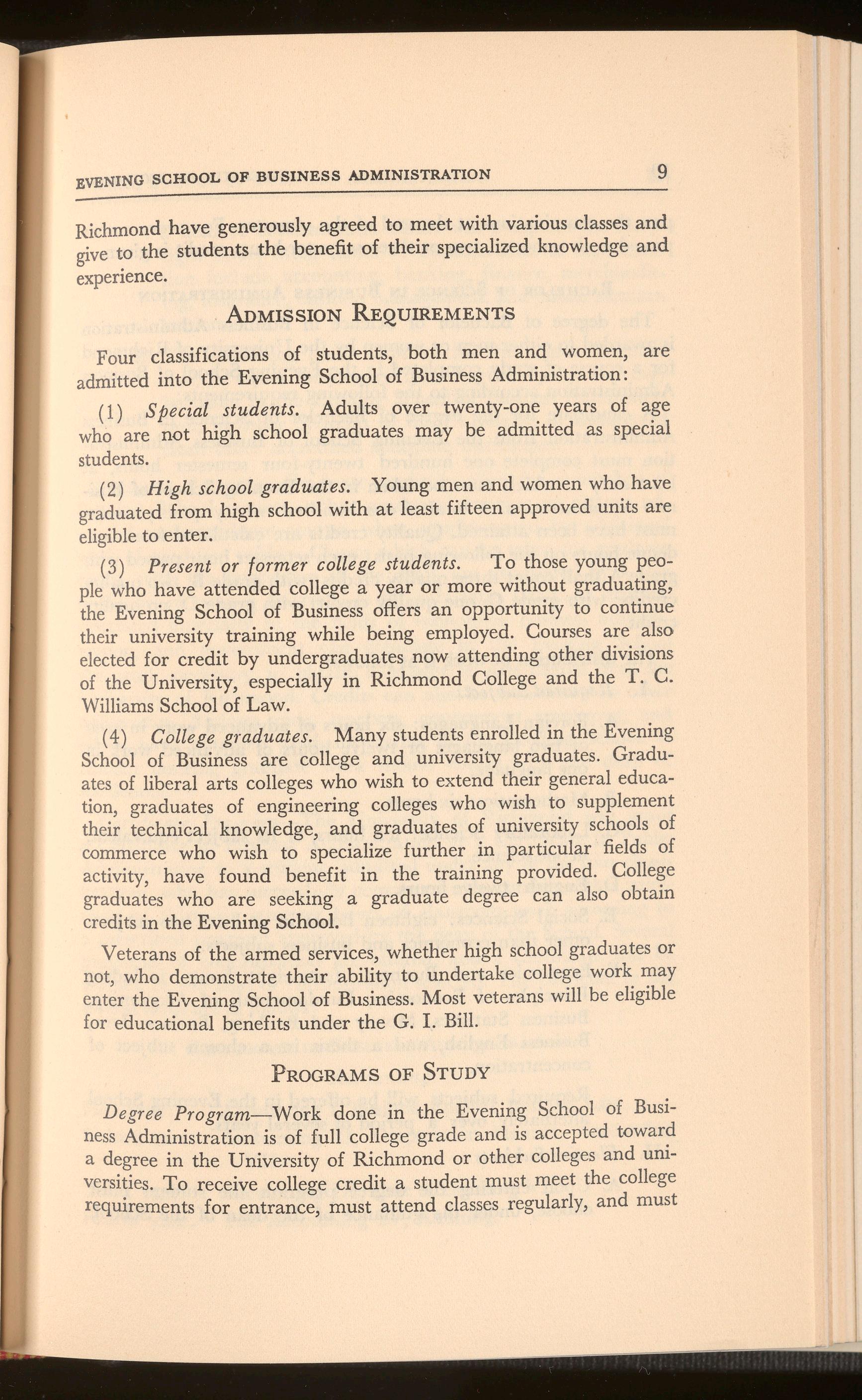
Richmond have generously agreed to meet with various classes and give to the students the benefit of their specialized knowledge and experience.
Four classifications of students, both men and women, are admitted into the Evening School of Business Administration:
( 1) Special students. Adults over twenty-one years of age who are not high school graduates may be admitted as special students.
(2) High school graduates. Young men and women who have graduate d from high school with at least fifteen approved units are eligible to enter.
(3) Present or former college students. To those young people who have attended college a year or more without graduating, the Evening School of Business offers an opportunity to continue their university training while being employed. Courses are also elected for credit by undergraduates now attending other divisions of the University, especially in Richmond College and the T. C. Williams School of Law.
(4) College graduates. Many students enrolled in the Evening School of Business are college and university graduates. Graduates of liberal arts colleges who wish to extend their general education, graduates of engineering colleges who wish to supplement their technical knowledge, and graduates of university schools of commerce who wish to specialize further in particular fields of activity, have found benefit in the training provided. College graduates who are seeking a graduate degree can also obtain credits in the Evening School.
Vetera ns of the armed services, whether high school graduates or not, who demonstrate their ability to undertake college work may enter the Evening School of Business. Most veterans will be eligible for educational benefits under the G. I. Bill.
Degree Program-Work done in the Evening School of Business Administration is of full college grade and is accepted toward a degree in the University of Richmond or other colleges and universities. To receive college credit a student must meet the college requireme nts for entrance, must attend classes regularly, and must
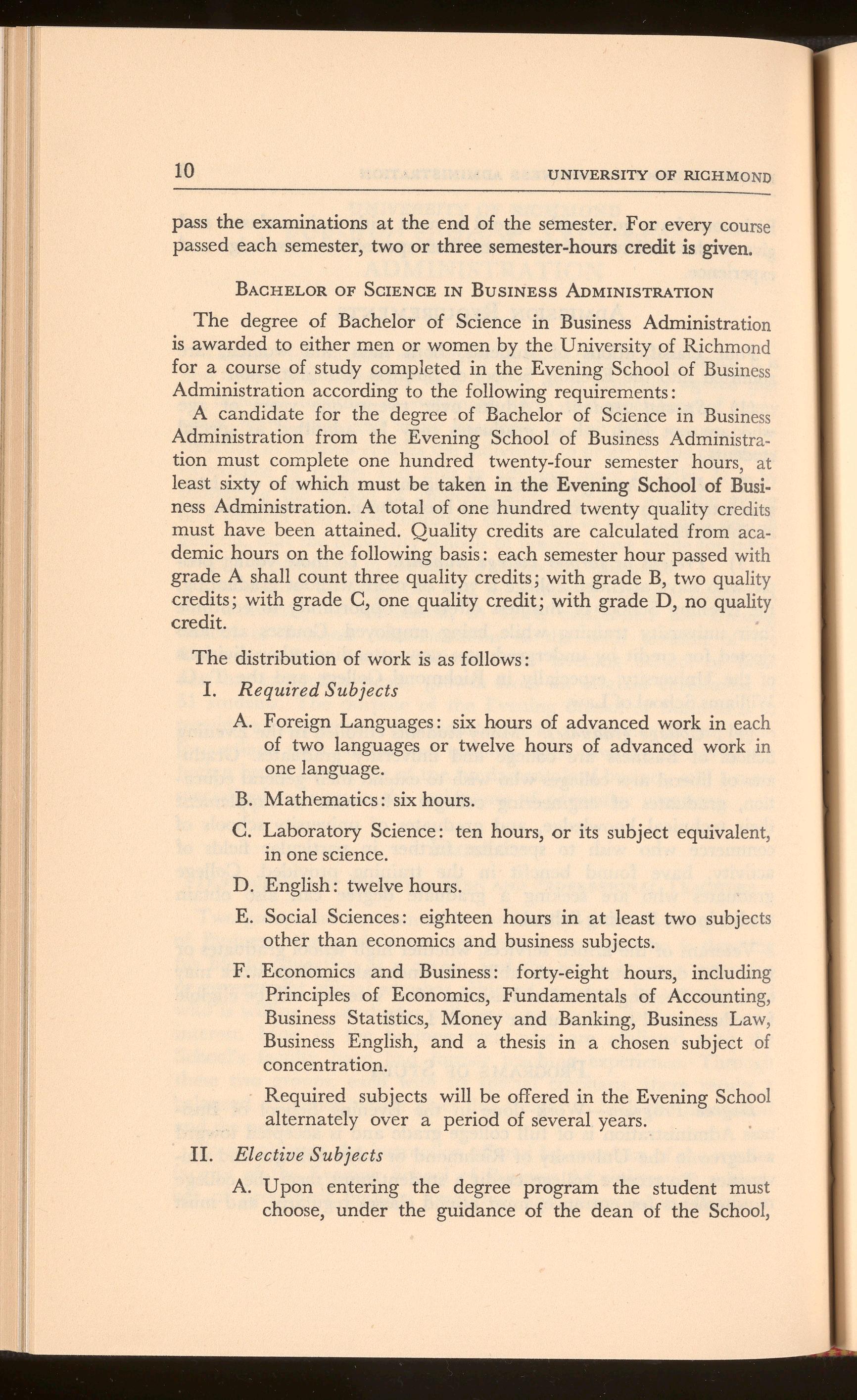
pass the examinations at the end of the semester. For every cou rse passed each semester, two or three semester-hours credit is given
The degree of Bachelor of Science in Business Administr ation is awarded to either men or women by the University of Richm ond for a course of study completed in the Evening School of Business Administration according to the following requirements:
A candidate for the degree of Bachelor of Sci ence in Business Administration from the Evening School of Business Admini stration must complete one hundred twenty-four semester hour s, at least sixty of which must be taken in the Evening School of Business Administration. A total of one hundred twenty quality cr edits must have be en attained. Quality credits are calculated from academic hours on the following basis: each semester hour passed with grade A shall count three quality credits; with grade B, two qua lity credits; with grade C , one quality credit; with grade D, no qu ality credit.
The distribution of work is as follows:
1. Required Subjects
A. Foreign Languages: six hours of advanced work in each of two languages or twelve hours of advanced work in one language.
B. Mathematics: six hours.
C. Laboratory Science: t en hours, or its subject equival ent, in one science.
D. English: twelve hours.
E. Social Sciences: eighteen hours in at least two subj ects other than economics and business subjects.
F. Economics and Business: forty-eight hours, includi ng Principles of Economics, Fundamentals of Accountin g, Business Statistics, Money and Banking, Business L aw, Business English, and a thesis in a chosen subj ect of concentration .
Required subjects will be offered in the Evening Scho ol alternately over a period of several years.
II. Elective Subjects
A. Upon entering the degree program the student mu st choose, under the guidance of the dean of the Schoo l,
a field of concentration which will complete the fortyeight hours listed under F. Possible fields of concentration include accounting, banking, finance, merchandising, insurance, business management, and public administration.
B. The remaining hours required for the degree are elective, in either business or liberal arts subjects, and may be taken in the Evening School of Business Administration, in other divisions of the University, or transferr ed from other accredited collegiate institutions.
Graduate Program-Graduate credit is given for a number of Evening School courses, either graduate seminars or certain advanced undergraduate courses when supplemented by additional work of graduate caliber. Classes which can be taken for graduate credit, with the permission of the dean, are de signated by a star in the list of courses described in the catalogue. Graduate students interes ted especially in the fields of economics, business administratio n, and government can complete in the Evening School the work necessary to obtain a Master of Arts degree from the Unive rsity of Richmond. Credits can also be transferred to other univers ities. Business men, teachers, government employees, and others have obtained graduate credits in the Evening School. A stude nt desiring graduate work should confer with the dean of the School.
Certificate Program-The University of Richmond will grant a Certificate in Business Administration or a Certificate in Public Adm inistration to a student, admitted under any of the four classifications, who has successfully completed nine courses with a minimum of thirty-six semester hours of classroom work according to a prescribed program approved by the dean of the School. Severa l prog rams of concentration are offered, and a Certificate will be gran ted in the field of concentration selected. The curricula in the severa l fields are as follows:
CERTIFICATE IN BUSINESS ADMINI'STRATION
Accounting

First year:
Second year:
Third year: Fourth year :
Accounting I, Business English, Business Law. Accounting II, Corporation Finance, Accounting VII.
Accounting III, Cost Accounting VI. Tax Accounting IV, Auditing.
First year:
Second year:
Third year:
First year:
Second year:
Third year:
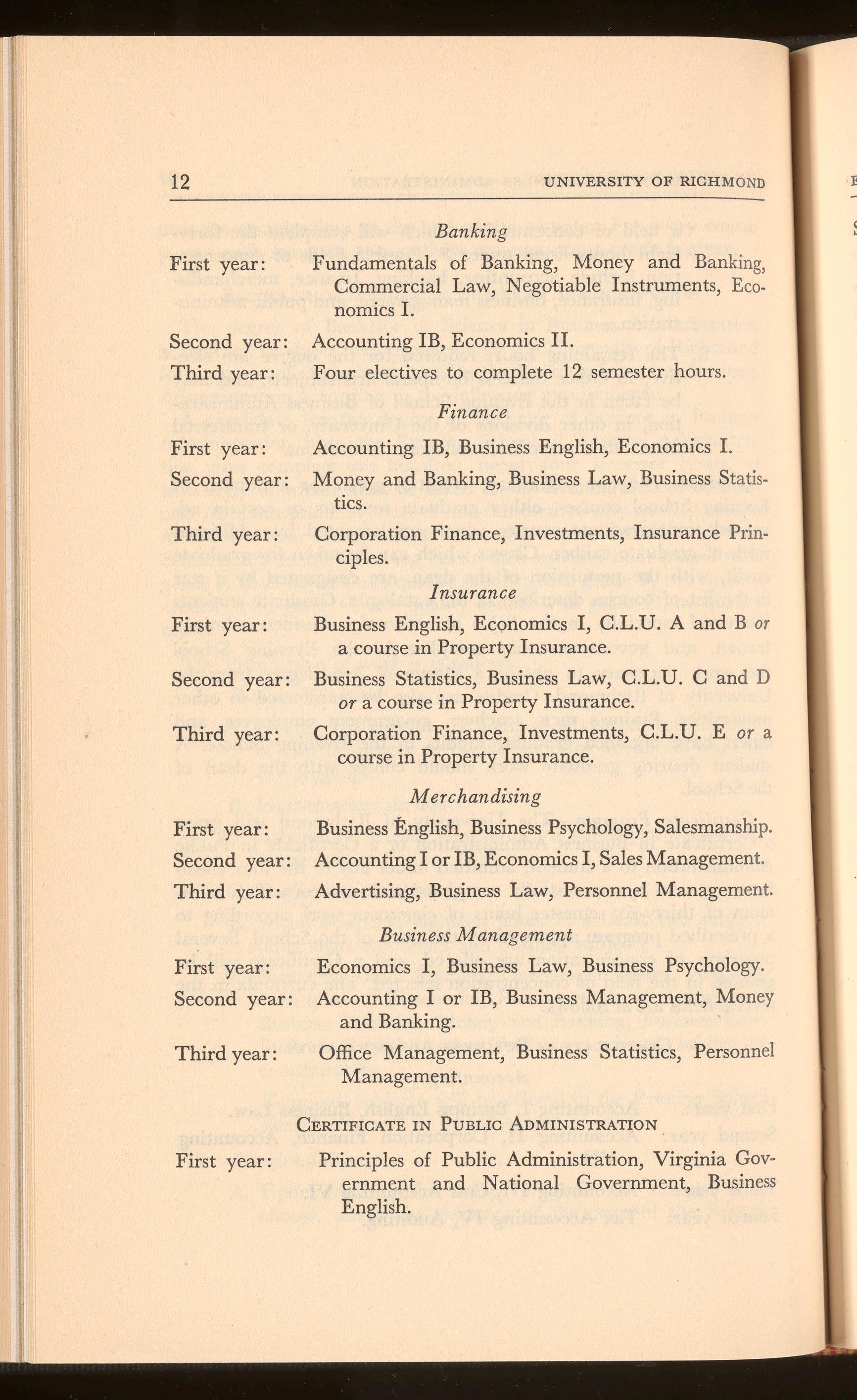
First year:
Second year:
Third year:
First year:
Second year:
Third year:
First year:
Second year:
Third year :
First year:
UNIVERSITY OF RICH MON D
Banking
Fundamentals of Banking , Mon ey and Ba n king, Commercial Law, N egoti a ble Instrument s, Economics I.
Accounting IB, E conomic s II .
Four electiv es to complete 12 semester hour s.
Finance
Accounting IB, Busine ss English, Economics I.
Mon ey and Banking, Bu siness Law, Busin ess Statistics .
Corporation Financ e, Investments, Insurance Principles
Insurance
Business English, Ec<;momics I, C L .U. A and B or a cour se in Property Insurance.
Business Statistics, Business Law, C.L.U. C and D or a course in Property Insurance.
Corporation Finance, Investments, C L.U. E or a course in Property Insurance.
Merchandising
Business English, Business Psychology, Salesman ship.
Accounting I or IB, Economics I, Sales Managem ent.
Advertising, Business Law, Personnel Managem ent.
Business Mana ge ment
Economics I, Bu siness L aw, Business Psycholo gy.
Accounting I or IB, Business Management, Mon ey and Banking.
Office Manag ement, Busin ess Statistics, Per sonnel Management.
CERTIFICATE IN PU BLIC ADMINISTRATION
Principles of Public Administration, Virginia G overnment and National Government, Business English.
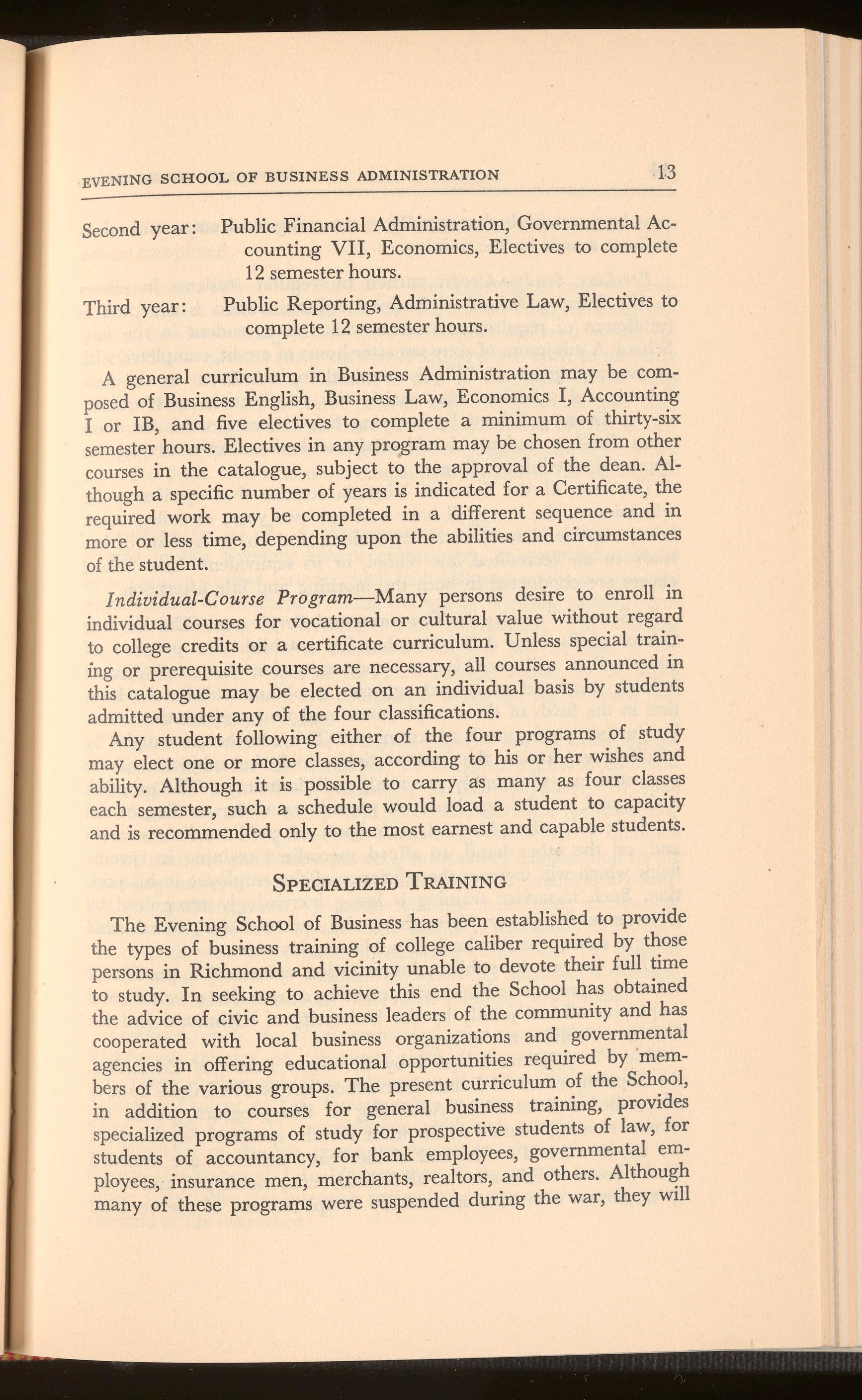
Second year: Public Financial Administration, Governmental Accounting VII, Economics, Electives to complete 12 semester hours.
Thir d year: Public Reporting, Administrative Law, Electives to complete 12 semester hours.
A general curriculum in Business Administration may be composed of Business English, Business Law, Economics I, Accounting I or IB, and five electives to complete a Ininimum of thirty-six semester hours. Electives in any program may be chosen from other courses in the catalogue, subject to the approval of the dean. Althoug h a specific number of years is indicated for a Certificate, the required work may be completed in a different sequence and in more or less time, depending upon the abilities and circumstances of th e student.
In dividual-Course Program-Many persons desire to enroll in individual courses for vocational or cultural value without regard to college credits or a certificate curriculum. Unless special training or prerequisite courses are necessary, all courses announced in this catalogue may be elected on an individual basis by students adm itted under any of the four classifications. Any student following either of the four programs of study may elect one or more classes, according to his or her wishes and ability. Although it is possible to carry as many as four classes each semester, such a schedule would load a student to capacity an d is recommended only to the most earnest and capable students
The Evening School of Business has been established to provide the types of business training of college caliber required by those persons in Richmond and vicinity unable to devote their full time to study In seeking to achieve this end the School has obtained the advice of civic and business leaders of the community and has cooperated with local business organizations and governmental agencies in offering educational opportunities required by 'members of the various groups. The present curriculum of the School, in addition to courses for general business training, provides sp ecialized programs of study for prospective students of law, for students of accountancy, for bank employees, governmental employees, insurance men, merchants, realtors, and others. Although many of these programs were suspended during the war, th ey will
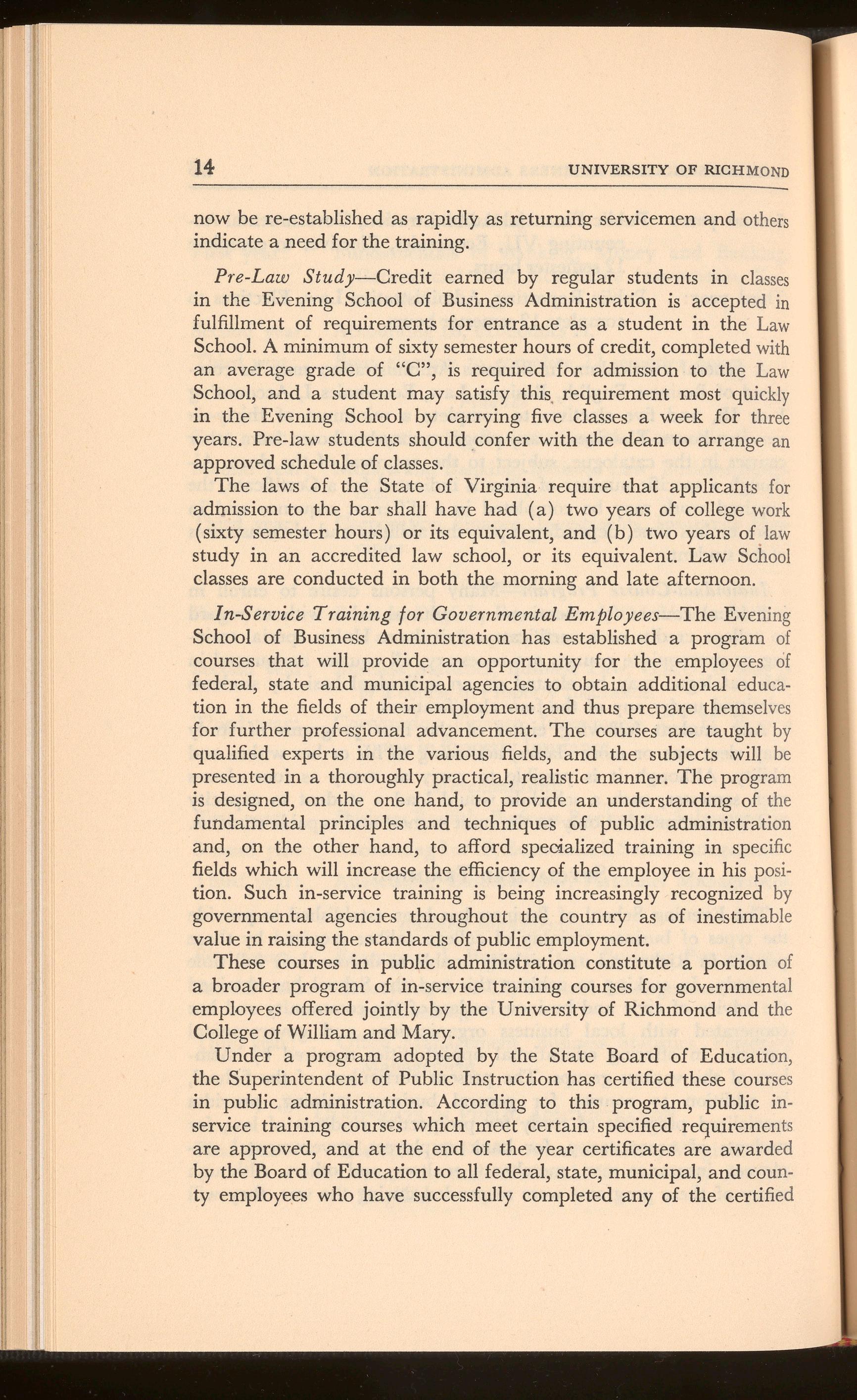
now be re-established as rapidly as returning servicemen and others indicate a need for the training.
Pre-Law Study-Credit earned by regular students in classes in the Evening School of Business Administration is accept ed in fulfillment of requirements for entrance as a student in the Law School. A minimum of sixty semester hours of credit, complet ed with an average grade of "C", is required for admission to th e Law School, and a student may satisfy this . requirement most qu ickly in the Evening School by carrying five classes a week for three years . Pre-law students should confer with the dean to arran ge an approved schedule of classes
The laws of the State of Virginia require that applicant s for admission to the bar shall have had (a) two years of college work (sixty semester hours) or its equivalent, and (b) two years of law study in an accredited law school, or its equivalent . Law School classes are conducted in both the morning and late afternoon.
Training for Governmental Employees-The Ev ening School of Business Administration has established a progra m of courses that will provide an opportunity for the employ ees cif federal, state and municipal agencies to obtain additional ed ucation in the fields of their employment and thus prepare thems elves for further professional advanc ement. The courses are taught by qualified experts in the various fields, and the subjects will be presented in a thoroughly practical, realistic manner. The pro gram is designed, on the one hand, to provide an understanding of the fundamental principles and techniques of public administra tion and, on the other hand, to afford specialized training in specific fields which will increase the efficiency of the employee in his p osition. Such in-service training is being increasingly recogniz ed by governmental agencies throughout the country as of inestim able value in raising the standards of public employment.
These courses in public administration constitute a portion of a broader program of in-service training courses for governm en tal employees offered jointly by the University of Richmond and the College of William and Mary.
Under a program adopted by the State Board of Educati on, the Superint endent of Public Instruction has certified these cour ses in public administration. According to this program, public inservice training courses which meet certain specified requirem ents are approved, and at the end of the year certificates are award ed by the Board of Education to all federal, state, municipal, and cou nty employees who have successfully completed any of the certifi ed
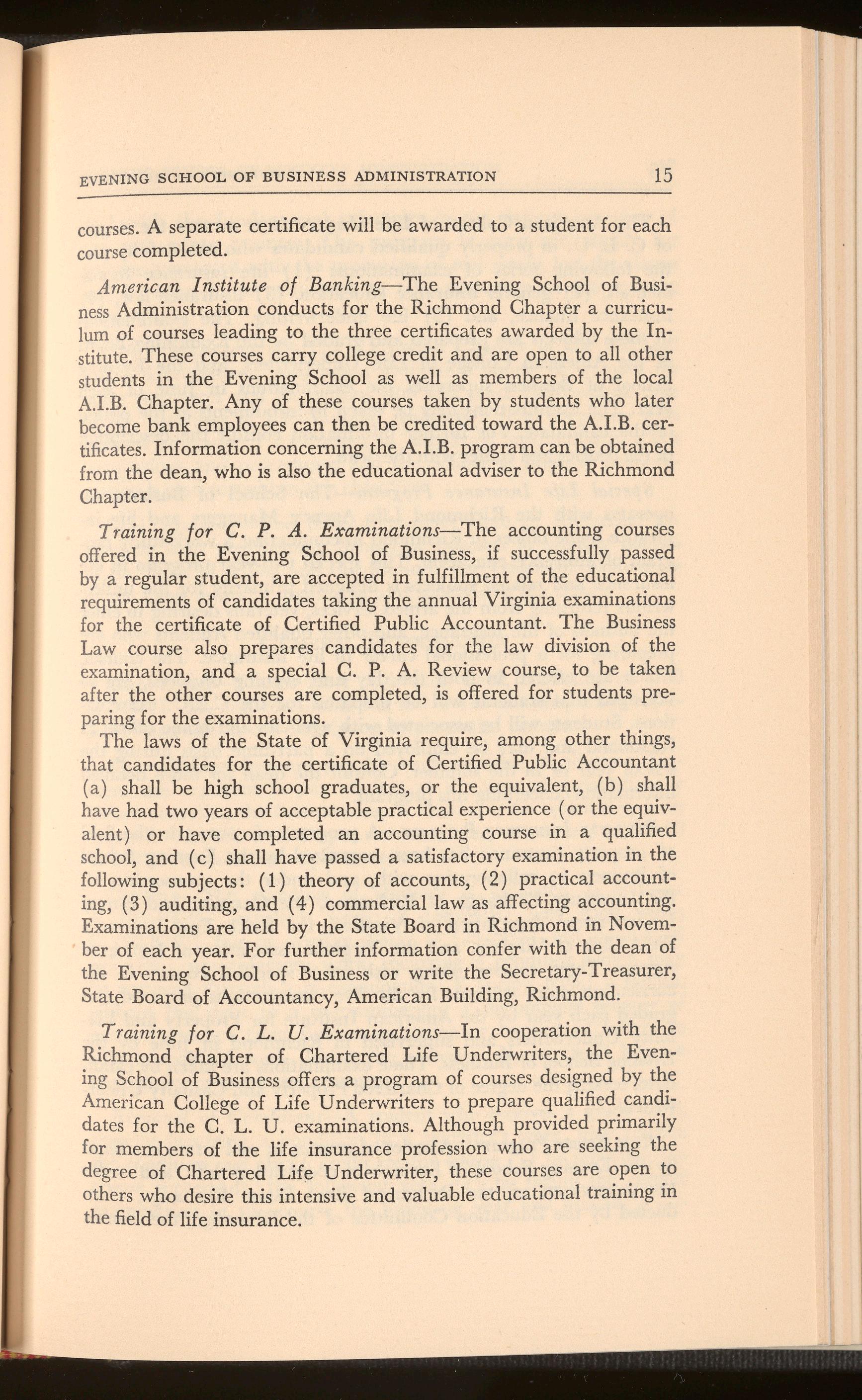
courses. A separate certificate will be awarded to a student for each course completed.
Amer ican Institute of Banking-The Evening School of Business Administration conducts for the Richmond Chapter a curriculum of courses leading to the three certificates awarded by the Institute. These courses carry college credit and are open to all other students in the Evening School as well as members of the local A.LB. Chapter. Any of these courses taken by students who later become bank employees can then be credited toward the A.LB. certificates. Information concerning the A.I .B. program can be obtained from the dean, who is also the educational adviser to the Richmond Chapte r.
Trai ning for C. P. A. Examinations-The accounting courses offered in the Evening School of Business, if successfully passed by a regular student, are accepted in fulfillment of the educational require ments of candidates taking the annual Virginia examinations for the certificate of Certified Public Accountant. The Business Law course also prepares candidates for the law division of the examination, and a special C. P. A. Review course, to be taken after the other courses are completed, is offered for students preparing for the examinations.
The laws of the State of Virginia require, among other things, that candidates for the certificate of Certified Public Accountant (a) sha ll be high school graduates, or the equivalent, (b) shall have had two years of acceptable practical experience ( or the equivalent) or have completed an accounting course in a qualified school, and ( c) shall have passed a satisfactory examination in the following subjects: ( 1) theory of accounts, ( 2) practical accounting, (3) auditing, and (4) commercial law as affecting accounting. Exam inations are held by the State Board in Richmond in November of each year. For further information confer with the dean of the Evening School of Business or write the Secretary-Treasurer, State Board of Accountancy, American Building, Richmond .
Training for C. L. U. Examinations-In cooperation with the Richm ond chapter of Chartered Life Underwriters, the Evening School of Business offers a program of course s designed by the America n College of Life Underwriters to prepare qualified candidates for the C. L. U. examinations. Although provided primarily for members of the life insurance profession who are seeking the degree of Chartered Life Underwriter, these cour ses are open to others who desire this intensive and valuable educational training in the field of life insurance.
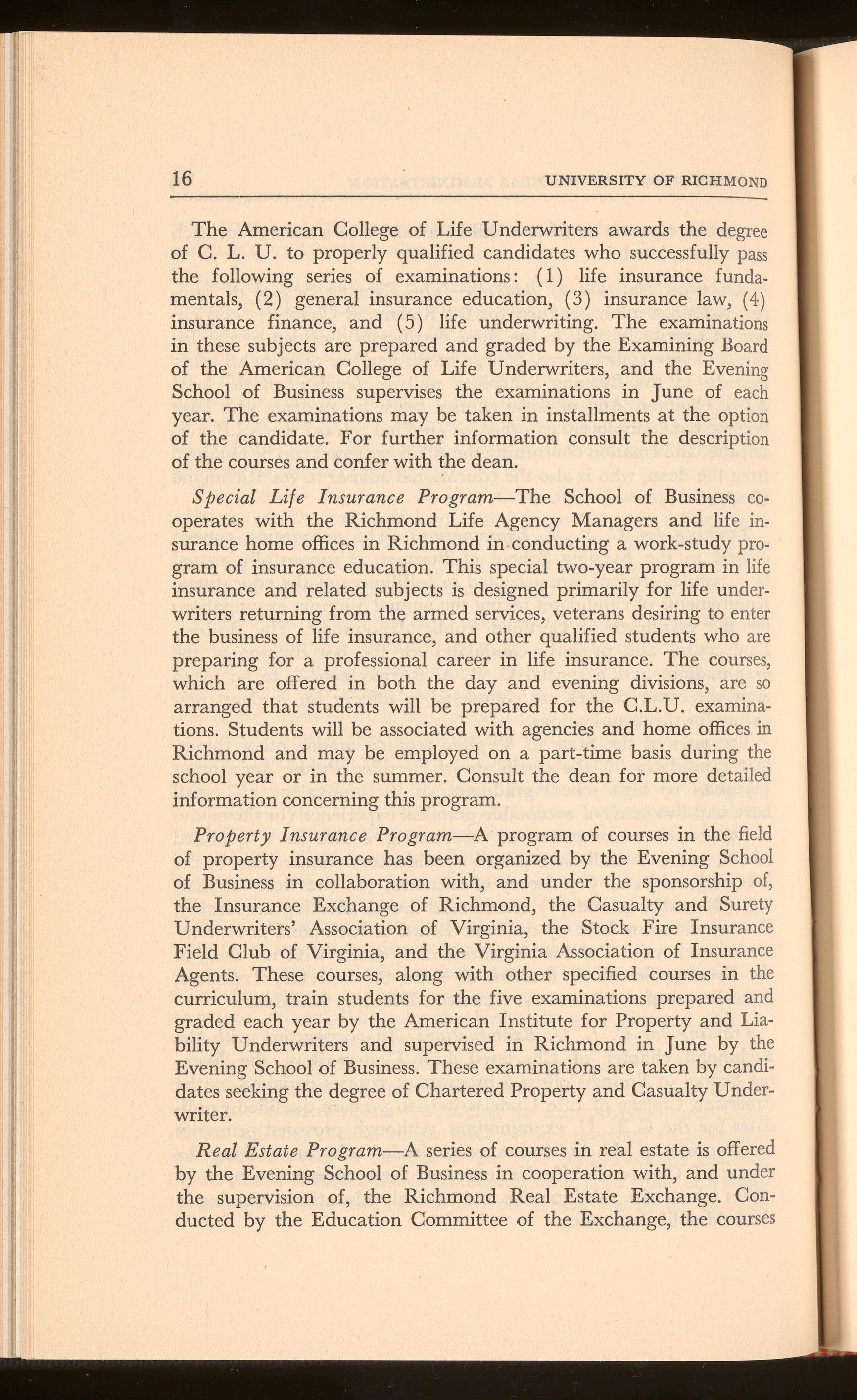
The American College of Life Underwriters awards the d egree of C. L. U to properly qualified candidates who successfull y pass the following series of examinations: ( 1) life insurance fu ndamentals, ( 2) general insurance education, ( 3) insurance law , (4) insurance finance, and ( 5) life underwriting. The examin ations in these subjects are prepared and graded by the Examining Board of th e American College of Life Underwriters, and the Ev ening School of Business sup ervises the examinations in June of each year. The examinations may be taken in installments at the option of the candidate. For further information consult the descri ptio n of the courses and confer with the dean.
Special Life Insurance Program-The School of Busine ss cooperates with the Richmond Life Agency Managers and life insurance home offices in Richmond in conducting a work-study program of insurance education . This special two-year program in life insurance and related subjects is de signed primarily for life un derwriters returning from the armed servic es, v eterans desiring to enter the business of life insurance, and other qualified students wh o are preparing for a professional car eer in life insurance. The cou rses, which are offer ed in both the day and evening divisions, are so arranged that stud ents will be prepared for the C.L.U. exam inations . Students will be associated with agencies and home offices in Richmond and may be employed on a p a rt-time basis during the school year or in the summer Consult th e de a n for more d et ailed information concerning this program
Property Insurance Program-A program of courses in the field of property insurance has been organized by the Evening School of Busine ss in collaboration with, and und er the sponsorshi p of, the Insurance Exchange of Richmond, the Ca sualty and Su rety Underwriters' Association of Virginia, the Stock Fire Insur ance Field Club of Virginia, and the Virginia Associa tion of Insu rance Agents. These courses, along with other specified courses in the curriculum, train students for the five examinations prepar ed and grad ed each year by the American In stitute for Property and L iability Underwriters and supervi sed in Richmond in June by the Evening School of Business. The se examinat ions are taken by candidates seeking the degree of Chartered Property and Casualty Und erwriter.
Real Estate Program-A series of courses in real estate is offered by the Evening School of Business in cooperation with, and und er the supervision of, the Richmond Real Estate Exchange. Co nducted by the Education Committee of the Exchange, the cour ses
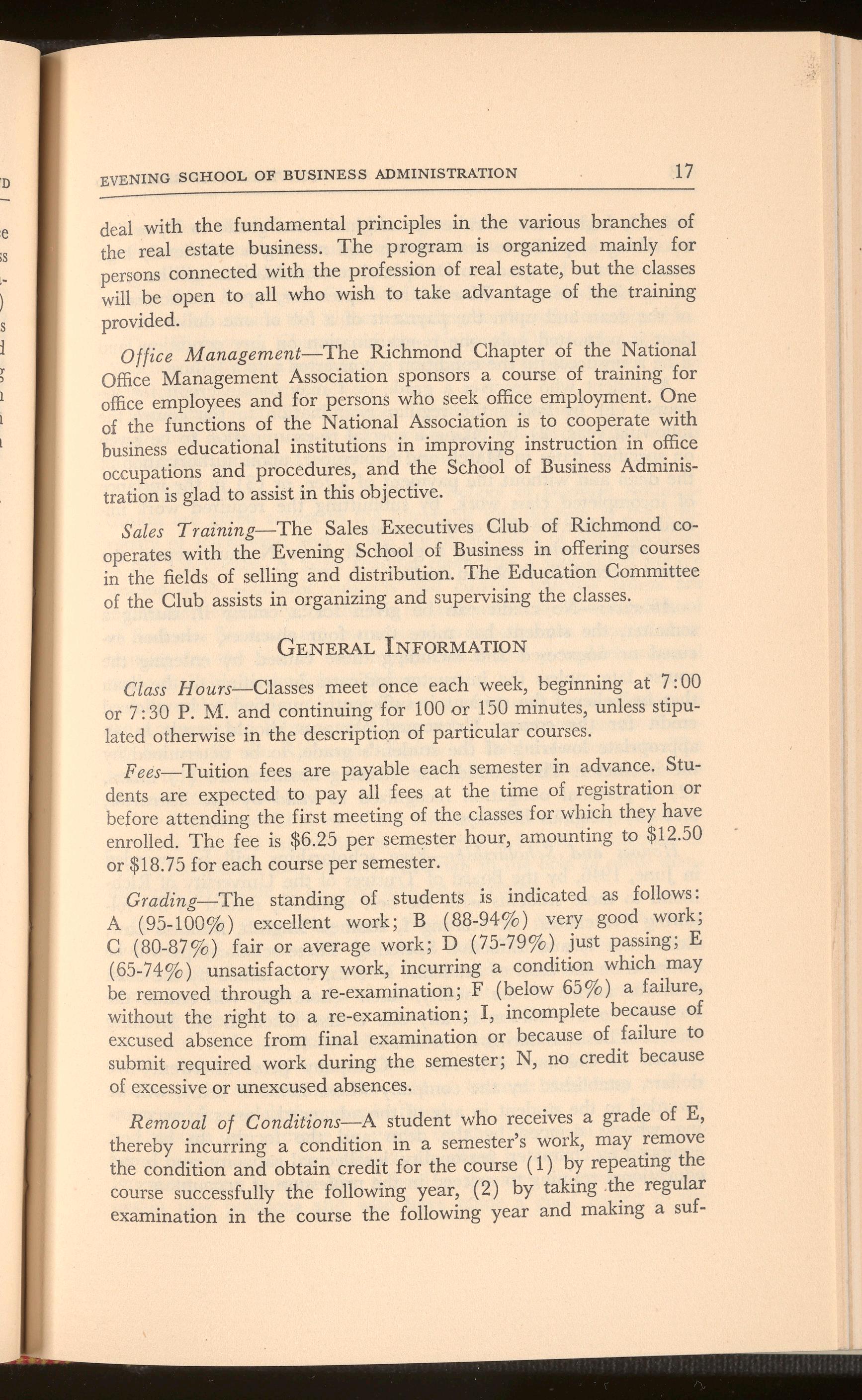
deal with the fundamental principles in the various branches of the real estate business. The program is organized mainly for persons connected with the profession of real estate, but the classes will be open to all who wish to take advantage of the training provided.
Office Management-The Richmond Chapter of the National Office Management Association sponsors a course of training for office employees and for persons who seek office employment. One of the functions of the National Association is to cooperate with business educational institutions in improving instruction in office occupations and procedures, and the School of Business Administration is glad to assist in this objective.
Sales Training-The Sales Executives Club of Richmond cooperates with the Evening School of Business in offering courses in the fields of selling and distribution. The Education Committee of the Club assists in organizing and supervising the classes.
Class Hours-Classes meet once each week, beginning at 7: 00 or 7: 30 P. M. and continuing for 100 or 150 minutes, unless stipulat ed otherwise in the description of particular courses.
Fees-Tuition fees are payable each semester in advance. Students are expected to pay all fees at the time of registration or before attending the first meeting of the classes for which they have enrolled. The fee is $6.25 per semester hour, amounting to $12.50 or $18.75 for each course per semester.
Grading-The standing of students is indicated as follows: A ( 95-100%) excellent work; B ( 88-94%) very good work; C (80-87%) fair or average work; D (75-79%) just passing; E (65-74%) unsatisfactory work, incurring a condition which may be removed through a re-examination; F (below 65%) a failure, without the right to a re-examination; I, incomplete because of excused absence from final examination or because of failure to submit required work during the semester; N, no credit because of excessive or unexcused absences.
Removal of Conditions-A student who receives a grade of E, thereby incurring a condition in a semester's work, may remove the condition and obtain credit for the course ( 1) by repeating the course successfully the following year, (2) by taking the regular examination in the course the following year and making a suf-

ficiently high mark to raise the original term grade to D, or (3) by taking a special re-examination and making a sufficiently high mark to raise his grade to D. Special re-examinations will be given on specified dates in March and September, upon authoriz ation of the dean and upon the payment of a fee of one dollar. A student is permitted only one re-examination on any condition, and if he is unsuccessful the condition is converted into a failure.
A student who receives a grade of I may obtai~ credit for the course ( 1) by taking the regular examination in the course the following year ( 2) by taking a special re-examination to be given on specified dates in March and September, upon authorization of the dean and without the payment of a fee, or ( 3) in the in st ance of incompleted class work, by submitting the required work immediately after the close of the semester.
A student who receives a grade of F or N must repeat the course successfully to obtain credit.
Absences-No credit can be given for a course if, durin g a semester, the student has more than four absences, whether excused or unexcused and including those caused by entering the course late, unless the instructor indicates in writing to the d ean that he believes the student is sufficiently qualified to be allow ed credit for the course. Unexcused absences should result in an appropriate lowering of the student's grade, to be determined by the instructor. The grounds for excusing absences are ( 1) illn ess, ( 2) a personal obligation recognized as valid by the instruct or, and ( 3) religious holidays.
Honors and Scholarships-Five scholarships will be award ed in June, 1946, by the Board of Trustees of the University of R ichmond to those students with the best scholasti9 record in the following five classes: Accounting I, Business English, Business L aw, Economics I, and Effective Speaking. These scholarships will be awarded on the basis of academic records, determined by the d ean with the advice of the faculty. Each scholarship will entitle the recipient to free tuition in any one course taken in the Evenin g School of Business during the session of 1946-47.
The T. Coleman Andrews & Company prize of twent y-five dollars, established by the company who se name it bears, will be awarded to the student in any of the advanced classes in accoun ting who is deemed by the dean and the faculty to be b est equipped by character, personality, intellectual capacity, and bro ad educational training to succeed in the profession of accountancy.

Eac h year the Life Agency Managers of Richmond award a prize to the student in the Evening School who attains the highest scholastic stan ding in the life insurance classes.
The Sales Executives Club of Richmond awards a prize to the studen t who attains the highest standing in the salesmanship class.
The Richmond Chapter of the National Office Management Association awards a prize to the student receiving the highest grade in the office management class.
The member of the American Institue of Banking who receives the highest grade in each A.I.B. class will be awarded first honors in the course, provided his grade is above 87%.
Library -Students in the Evening School of Business Administratio n are given access to the library of this division of the University of Richmond and to the library facilities of other divisions of the University. A large reading room and a specialized library dealing with economic subjects and current business affairs are mainta ined especially for the use of students of the Evening School -0f Business. Students are encouraged to broaden the scope of their trainin g by the use of current periodical and pamphlet material made available in the School library.
A special collection of books in accounting and finance, known as the Accountants' Library of Richmond, is maintained in the Evening School by the Richmond Society of Public Accountants. The books in the collection are available to all accountants and students of acco unting in the city.
The Richmond Chapter of the National Office Management Associat ion has also established in the Evening School a collection of books, pamphlets, and research materials in the field of office manageme nt, available to all who may be interested.
Voc ational Counseling and Placement of Students-To help studen ts find the vocation for which they are best suited, members of the staff of the University of Richmond will conduct vocational aptitu de tests which may be taken by students registered in the Evening School of Business. The results of these scientific t ests, comb ined with individual discussions with students, will be used as the basis for giving students who desire advice all possible assistance in determining the field of business they may wish to enter and for which they may be fitted.
Although no promise is made by the School of Business to secure positions for its students, an effort is made to find places for those who inform the School authorities of their desire to obtain new positions and who have made a good record in the

School. Gratifying success has attended the efforts to aid cap able students in making connections with business firms.
Student Activities-Students of the Ev ening School of Business Administration are students of the University of Richmo nd. The traditions of the other colleges of the University are well kn own in the city. Tradition is also present in the spirit of the person nel of this college, and it is the policy of the administration and fa culty to foster any proper organizations and activities that the stud ents should undertake.
Location-The Evening School of Business Administration is located in Columbia Building at the corner of West Grace Str eet and North Lombardy Street.

For 1945-1946
The right is reserved to withdraw courses in which the enrollment is less than fifteen. Starred courses may be taken for graduate credit upon fulfilling additional requirements. Courses enclosed in brackets will not be offered in 1945-46, unless the war's end causes a sufficient increase in registrations .
AccOUNTING I. FUNDAMENTALS OF ACCOUNTING MR. KIDD.
Thursday, 7 :00-9:30, both semesters. Six hours credit. Textbook, including practice materials, $6.50.
This course provides an introduction to the science of accounting ( 1) for those who intend to prepare themselves for accountancy as a profession, (2) for those desiring the elements of accounting applicable in the practice of law, and (3) for those employed in the financial departments of governmental agencies. The study, though suited to the needs of beginners, advances rapidly through the principles of double entry bookkeeping to the construction of financial and operating statements. Interpretation of balance sheets and income statements of the sole proprietorship, the partnership, and the corporation will receive attention.
ACCOUNTING IB. GENERAL ACCOUNTING MR. GEE.
Wednesday, 7 :00-9:30, both semesters. Six hours credit. Text book, including practice materials, $6.25.
This course provides a general knowledge of elementary accounting ( 1) for those employed in banks and other financial establishments, (2) for those seeking a general accounting foundation in the various fields of business administration, and ( 3) for those not continuing further with the study of accounting. In the first semester the basic principles of accounting are studied, including debit and credit, the keeping of double entry records, ledgers and journals, and the preparation of balance sheets and profit and loss statements. The second semester develops the principles of partnership and corporation accounting, with a treatment of capital stock, surplus, dividends, reserves, bonds, sinking funds, statement analysis and interpretation.
ACCOUNTING II. INTERMEDIATE ACCOUNTING MR. ZACHARIAS. Monday, 7:30-9:10, both semesters. Four hours credit. Textbook, $4.00.
To enter this course a student must have completed an introductory course in the science of accounting. The study of accounting for
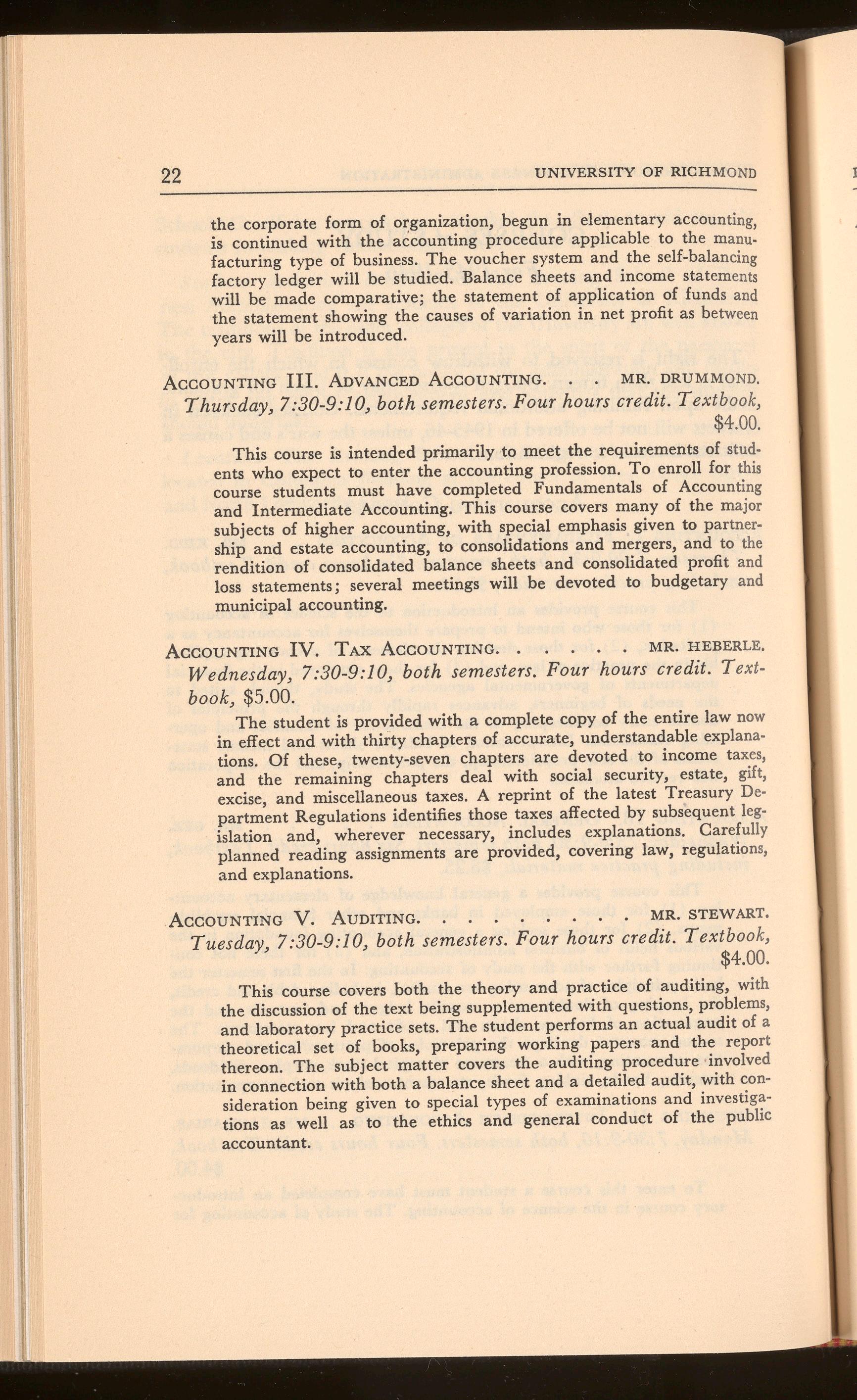
the corporate form of organization, begun in elementary account ing is continued with the accounting procedure applicable to the manu'. facturing type of business . The voucher system and the self-balan cing factory ledger will be studied. Balance sheets and income statem ents will be made comparative; the statement of application of fund s and the statement showing the causes of variation in net profit as bet ween years will be introduced.
ACCOUNTING Ill. ADVANCED ACCOUNTING
MR. DRUMM OND. Thursday, 7:30-9:10, both semesters. Four hours credit. Textb ook, $4.00.
This course is intended primarily to meet the requirements of students who expect to enter the accounting profession. To enroll for this course students must have completed Fundamentals of Accoun ting and Intermediate Accounting. This course covers many of the m ajor subjects of higher accounting, with special emphasis given to part nership and estate accounting, to consolidations and mergers, and to the rendition of consolidated balance sheets and consolidated profit and loss statements; several meetings will be devoted to budgetary and municipal accounting.
ACCOUNTING IV. TAX ACCOUNTING.
MR. HEBER LE. Wednesday, 7:30-9:10, both semesters. Four hours credit. T extbook, $5.00
The student is provided with a complete copy of the entire law now in effect and with thirty chapters of accurate, understandable expl anations. Of these, twenty-seven chapters are devoted to income t axes, and the remaining chapters deal with social security, estate, gift, excise, and miscellaneous taxes . A reprint of the latest Treasury Department Regulations identifies those taxes affected by subsequent legislation and, wherever necessary, includes explanations Carefu lly planned reading assignments are provided, covering Jaw, regulati ons, and explanations.
ACCOUNTING V. AUDITING.
MR. STEWAR T. Tuesday, 7:30-9:10, both semesters. Four hours credit. Textboo k, $4.0 0.
This course covers both the theory and practice of auditing, with the discussion of the text being supplemented with questions, probl ems, and laboratory practice sets. The student performs an actual audit of a theoretical set of books, preparing working papers and the repo rt thereon. The subject matter covers the auditing procedure involv ed in connection with both a balance sheet and a detailed audit, with consideration being given to special types of examinations and inv estig ations as well as to the ethics and general conduct of the pub lic accountant.
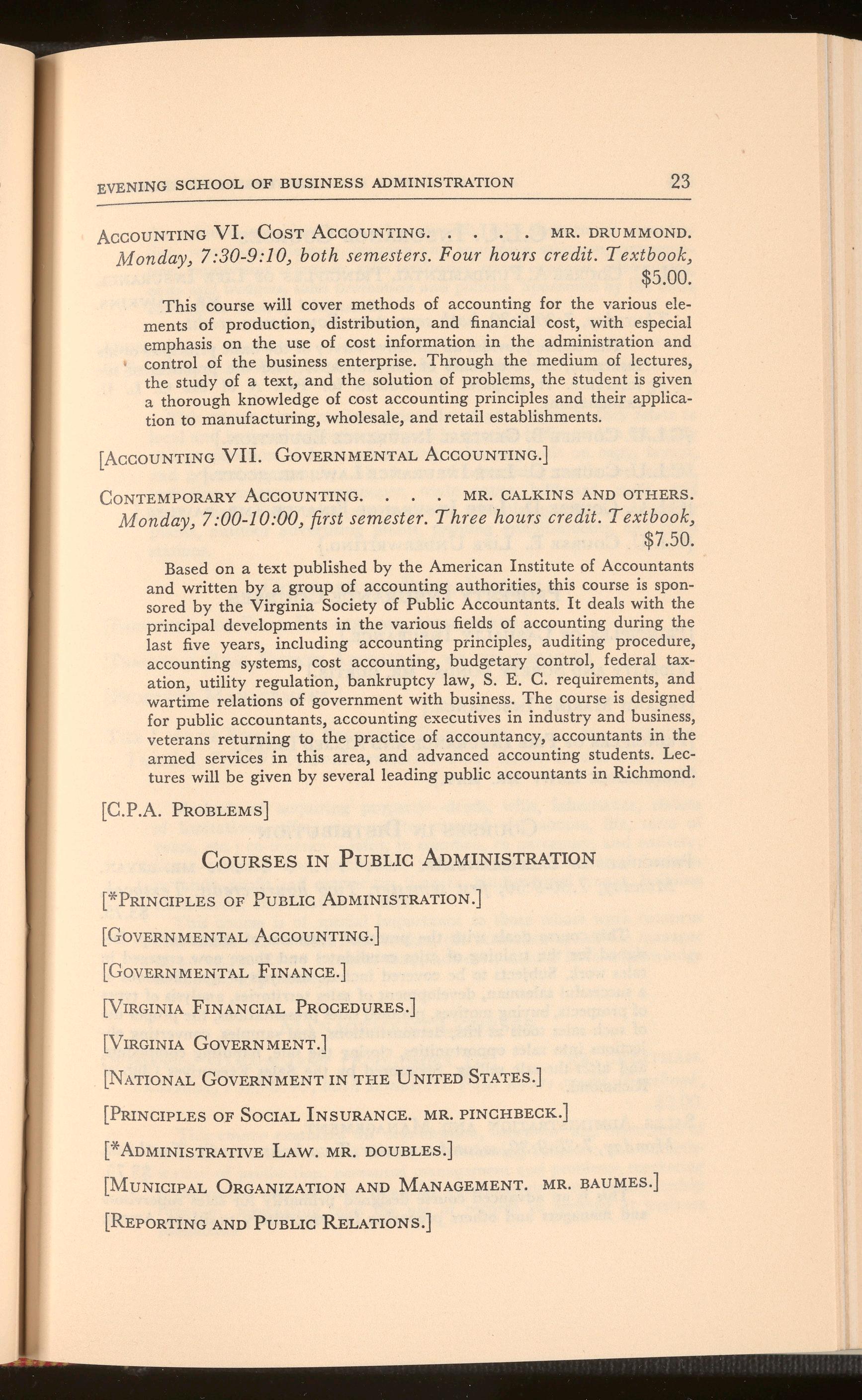
EVENING SCHOOL OF BUSINESS ADMINISTRATION
AccouNTING VI. CosT AccouNTING.
MR. DRUMMOND. Monday, 7:30-9:10, both semesters. Four hours credit. Textbook, $5.00.
This course will cover methods of accounting for the various elements of production, distribution, and financial cost, with especial emphasis on the use of cost information in the administration and • control of the business enterprise. Through the medium of lectures, the study of a text, and the solution of problems, the student is given a thorough knowledge of cost accounting principles and their application to manufacturing, wholesale, and retail establishments.
[AccouNTING VII. GovERNMENTAL AccouNTING.]
CONTE MPORARY ACCOUNTING.
MR. CALKINS AND OTHERS. Monday, 7:00-10:00, first semester. Three hours credit. Textbook, $7.50.
Based on a text published by the American Institute of Accountants and written by a group of accounting authorities, this course is sponsored by the Virginia Society of Public Accountants. It deals with the principal developments in the various fields of accounting during the last five years, including accounting principles, auditing procedure, accounting systems, cost accounting, budgetary control, federal taxation, utility regulation, bankruptcy law, S. E. C. requirements, and wartime relations of government with business. The course is designed for public accountants, accounting executives in industry and business, veterans returning to the practice of accountancy, accountants in the armed services in this area, and advanced accounting students. Lectures will be given by several leading public accountants in Richmond
[C.P.A. PROBLEMS]
CouRSES IN Pum.1c ADMINISTRATION
[*PRINCIPLES OF Punuc ADMINISTRATION.]
[GovERNMENTAL AccouNTING.]
[GOVE RNMENTAL FINANCE.]
[VIRGIN IA FINANCIAL PROCEDURES.]
[VIRGINIA GOVERNMENT.]
[NA TIONAL GOVERNMENT IN THE UNITED STATES.]
[PRINCIPLES OF SOCIAL INSURANCE. MR. PINCHBECK.]
[*ADMINISTRATIVE LAW. MR. DOUBLES.]
[MUNICIPAL ORGANIZATION AND MANAGEMENT. MR. BAUMES.]
[REPORTING AND PUBLIC RELATIONS.]

UNIVERSITY OF RICH MOND
C.L.U. COURSE A. FUNDAMENTAL PRINCIPLES OF LIFE INSURA NCE. MR . HAW KINS. Thursday, 7:30-9:30, both semesters. Four hours credit.
This course provides an intensive survey of the basic principles 0f life insurance, the economies of life insurance, and the practices of life insurance. It prepares the student for Part A of the C. L . U. examinations .
rc.L.u. couRsE B. GENERAL INsuRANcE EDucATION.J
[C.L U. COURSE C. LIFE INSURANCE LAW. MR SCOTT ]
[C.L.U. COURSE D. LIFE INSURANCE FINANCE. MR. RAWLES ]
[C.L.U. COURSE E LIFE UNDERWRITING.]
[PRINCIPLES OF CASUALTY INSURANCE.]
[FIDELITY AND SURETY BONDS. MR. CURTIS ]
[INLAND MARINE INSURANCE.]
[PRINCIPLES OF FIRE INSURANCE AND ALLIED LINES.]
[INSURANCE LAW. MR. MAY.]
PRINCIPLES OF SALESMANSHIP Monday , 7:30-9:30, first semester. Two hours • MR. BRYAN. cre dit. Textb ook, $3.75.
This course deals with the practical elements of salesmanship. Designed for the training of sales candidates and those now engaged in sales work. Subjects to be covered include analysis of qualification s of a successful salesman, development of sales territories, analysis of t ypes of prospects, buying motives, planned sales presentations, the prope r use of such sales tools as kits, demonstrations, and samples, converting objections into sales opportunities, closing the sale, handling compla ints, and aft e r-the-sale seJling . Sponsored by the Sales Executives Clu b of Richmond.
SALES ADMINISTRATION AND MANAGEMENT. Monday, 7:30 -9:30, second semester. Two hours credit. Textbo ok, $3.75.
This is an advanced course designed primarily for sales supervi sors and managers and others preparing for supervisory positions. Amo ng
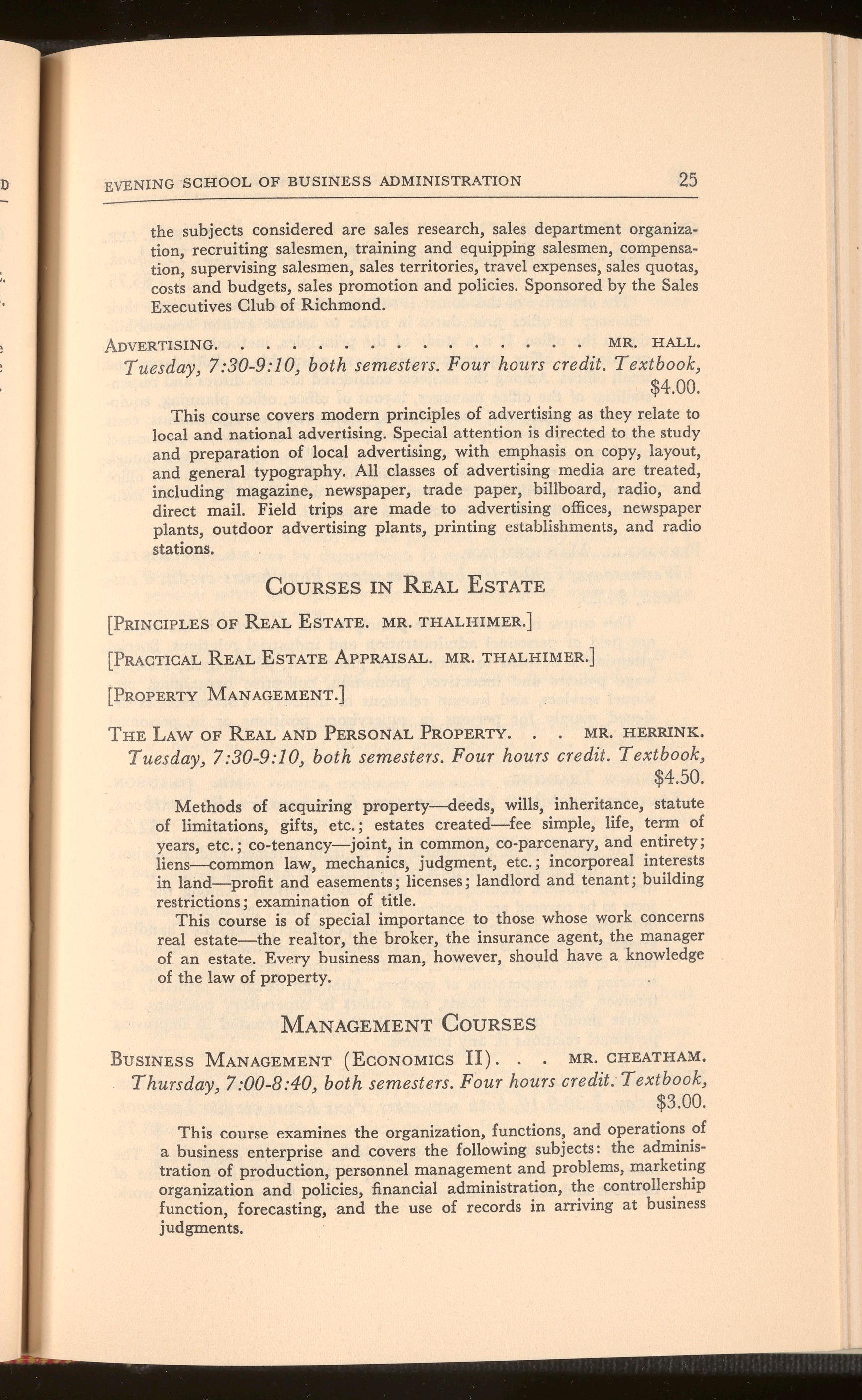
the subjects considered are sales research, sales department organization, recruiting salesmen, training and equipping salesmen, compensation, supervising salesmen, sales territories, travel expenses, sales quotas, costs and budgets, sales promotion and policies. Sponsored by the Sales Executives Club of Richmond.
ADVERTISING.
MR. HALL. Tuesday, 7:30-9:10, both semesters. Four hours credit. Textbook, $4.00.
This course covers modern principles of advertising as they relate to local and national advertising. Special attention is directed to the study and preparation of local advertising, with emphasis on copy, layout, and general typography. All classes of advertising media are treated, including magazine, newspaper, trade paper, billboard, radio, and direct mail. Field trips are made to advertising offices, newspaper plants, outdoor advertising plants, printing establishments, and radio stations.
[PRINCIPLES OF REAL ESTATE. MR. THALHIMER.]
[PRACTICAL REAL ESTATE APPRAISAL. MR. THALHIMER.]
[PROPERTY MANAGEMENT.]
THE LAW OF REAL AND PERSONAL PROPERTY. MR. HERRINK. Tuesday, 7:30-9:10, both semesters. Four hours credit. Textbook, $4.50.
Methods of acquiring property--deeds, wills, inheritance, statute of limitations, gifts, etc.; estates created-fee simple, life, term of years, etc.; co-tenancy-joint, in common, co-parcenary, and entirety; liens--common law, mechanics, judgment, etc.; incorporeal interests in land-profit and easements; licenses; landlord and tenant; building restrictions; examination of title.
This course is of special importance to those whose work concerns real estate-the realtor, the broker, the insurance agent, the manager of. an estate. Every business man, however, should have a knowledge of the law of property.
BusINEss MANAGEMENT (EcoNOMICS II). MR. CHEATHAM. Thursday, 7:00-8:40, both semesters. Four hours credit:Textbook, $3.00.
This course examines the organization, functions, and operations of a business enterprise and covers the following subjects: the administration of production, personnel management and problems, marketing organization and policies, financial administration, the controllership function, forecasting, and the use of records in arriving at business judgments.
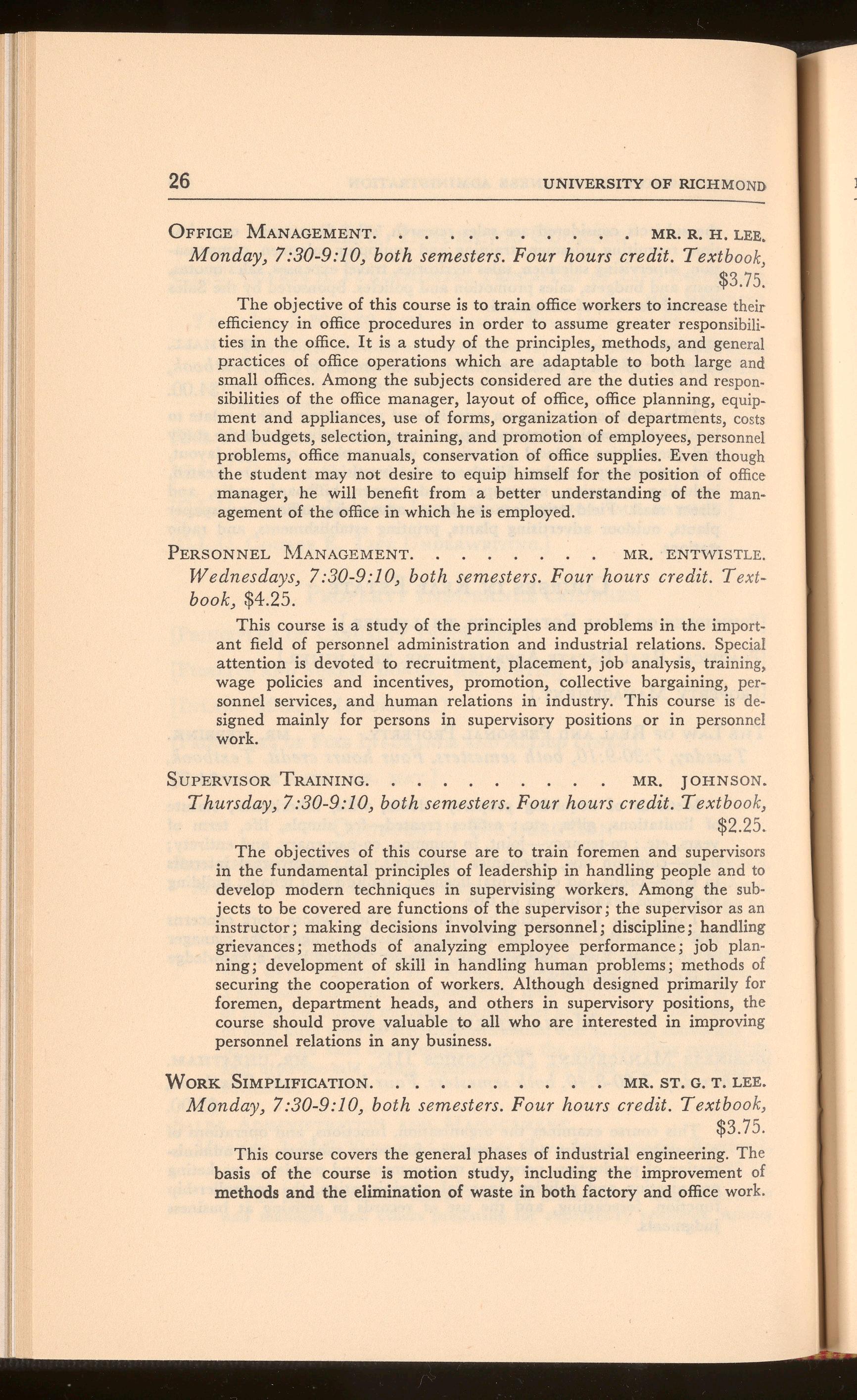
OFFICE MANAGEMENT.
MR. R H . LEE. Monday , 7:30-9 :10, both semesters . Four hours credit. Text book, $3.75.
The objective of this course is to tr a in office workers to increas e their efficiency in office procedures in order to assume greater respon sibilities in the office. It is a study of the principles, methods, and g eneral practices of office operations which are adaptable to both larg e and small offices. Among the subjects considered are the duties and r esponsibilities of the office manager, layout of office, office plannin g, equipm e nt and appliances, use of forms, organization of departm ent s, costs and budgets, selection, training, and promotion of employees, p er sonnel problems, office manuals , conservation of office supplies Even th ough the student may not desire to equip himself for the position of office manager, he will benefit from a better understanding of the management of the office in which he is employed.
PERSONNEL 1-AAN AGE MENT
Wednesdays, 7 :30-9: 10, both book, $4.25.
MR. ENTWI STLE. semest ers Four hours credit. Text-
This course is a study of the principles and problems in the im portant field of p ersonnel administration and industrial relations. Special attention is devoted to recruitment, plac ement, job analysis, tr aining, wage policies and incentives, promotion, collective bargainin g, personnel services, and human relations in industry . This course is designed mainly for persons in supervisory positions or in p er sonnel work.
SUPERVISOR TRAINING.
MR . JOHN SON. Thursday, 7:30-9:10, both semesters. Four hours credit. Textb ook, $2.25.
The objectives of this course are to train foremen and superv isors in the fundamental principl es of leadership in handling people and to develop modern techniques in supervising workers. Among the subjects to be covered are functions of the supervisor; the supervisor as an instructor ; making decisions involving personnel; discipline ; hand ling grievances; methods of analyzing employee performance ; job p lanning; development of skill in handling human probl ems; method s of securing the cooperation of workers. Although designed primaril y for foremen, department heads , and others in supervisory positions, the course should prove valuable to all who are interested in impro ving personnel relations in any business.
WORK SIMPLIFICATION.
MR. ST. G. T . L EE. Monday, 7:30-9: 10, both semesters. Four hours credit. Textb ook, $3.75.
This course covers the general phases of industrial engineering . The basis of the course is motion study, including the improvement of methods and the elimination of waste in both factory and office wo rk.
Also covered are time study, job evaluation, operator training, and standard cost. Motion pictures of typical operations are used, and students will make and analyze charts of actual operations. Work simplification methods can be successfully applied in industrial plants, financial institutions, commercial establishments, offices, and other business organizations.
[SCIEN TIFIC MANAGEMENT. MR. DAVENPORT.]
FUNDA MENTALS OF BANKING.
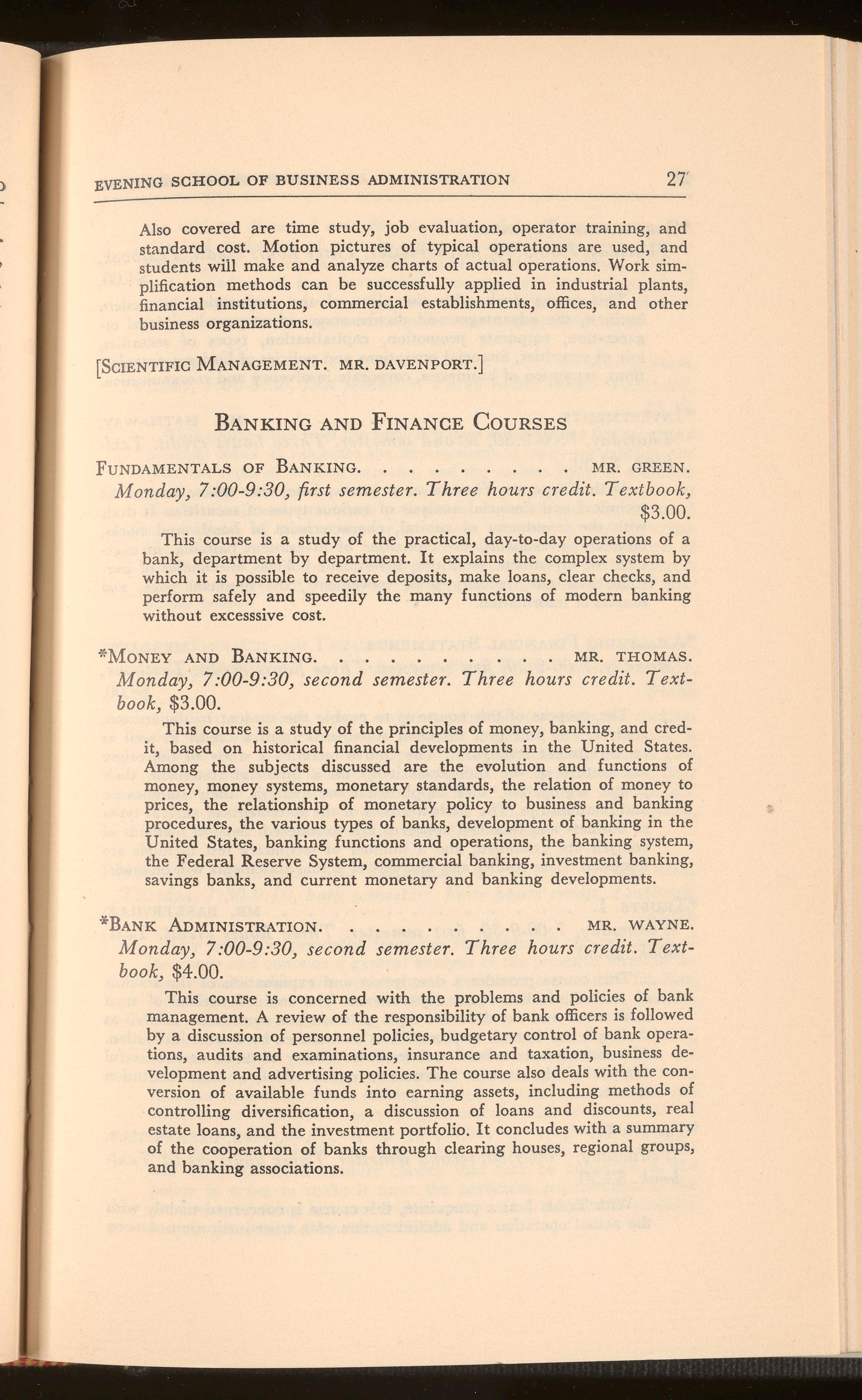
MR. GREEN.
Mo nday, 7:00-9:30, first semester. Three hours credit. Textbook, $3.00.
This course is a study of the practical, day-to-day operations of a ba nk, department by department It explains the complex system by which it is possible to receive deposits, make Joans, clear checks, and p erform safely and speedily the many functions of modern banking without excesssive cost.
*MON EY AND BANKING.
Mo nday, 7 :00-9:30, second semester. book, $3.00.
MR. THOMAS. Three hours credit. T ext-
This course is a study of the principles of money, banking, and credit, based on historical financial developments in the United States. Among the subjects discussed are the evolution and functions of money, money systems, monetary standards, the relation of money to prices, the relationship of monetary policy to business and banking procedures, the various types of banks, development of banking in the United States, banking functions and operations, the banking system, the Federal Reserve System, commercial banking, investment banking, savings banks, and current monetary and banking developments
·•BANK ADMINISTRATION.
Mo nday, 7:00-9:30, second semester. Three book, $4.00.
MR W AYNE. hours credit. T ext-
This course is concerned with the problems and policies of bank management . A review of the responsibility of bank officers is followed by a discussion of personnel policies, budgetary control of bank op erat ions, audits and examinations, insurance and taxation, business dev elopment and advertising policies. The course also deals with th e conversion of available funds into earning assets, including methods of controlling diversification, a discussion of Joans and discount s, r eal estate loans, and the investment portfolio It concludes with a summary of the cooperation of banks through clearing houses, r egional groups, and banking associations .
UNIVERSITY OF RICH MON D
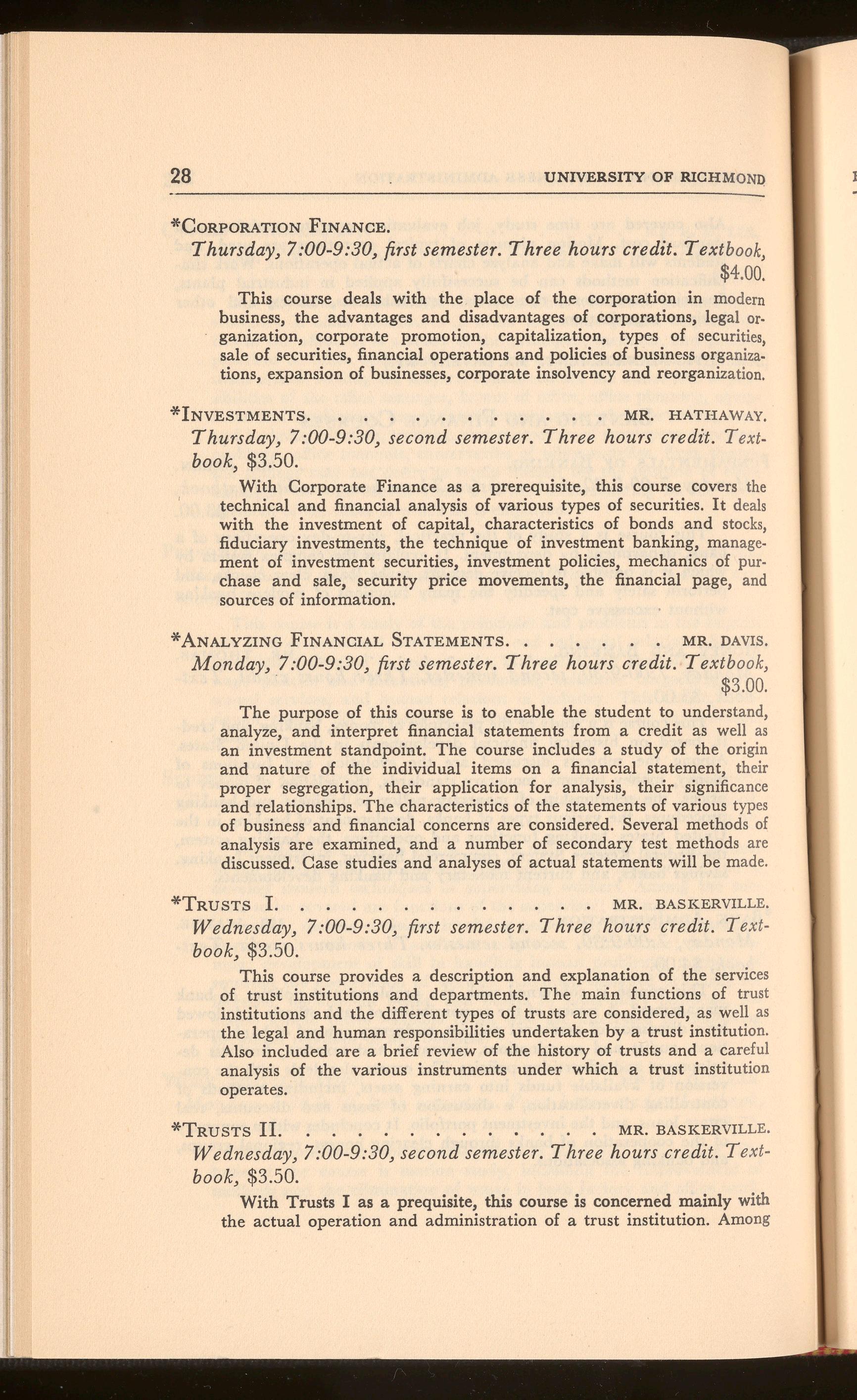
*CORPORATION FINANCE.
Thursday, 7:00-9:30, first semester. Three hours credit. Text book, $4.00.
This course deals with the place of the corporation in m odern business, the advantages and disadvantages of corporations, leg al organization, corporate promotion, capitalization, types of secu rities, sale of securities, financial operations and policies of business org aniza tions, expansion of businesses, corporate insolvency and reorgan ization.
*INVESTMENTS.
MR. HATH AWAY
Thursday, 7:00-9:30, second semester. Three hours credit. Textbook, $3.50.
With Corporate Finance as a prerequisite, this course cove rs the technical and financial analysis of various types of securities It deals with the investment of capital, characteristics of bonds and stocks, fiduciary investments, the technique of investment banking, m anagement of investment securities, investment policies, mechanics of purchase and sale, security price movements, the financial page , and sources of information .
* ANALYZING FINANCIAL STATEMENTS.
MR. DAVIS. Monday, 7:00-9 :30, first se mester. Three hours credit. Te x t book, $3.00.
The purpose of this course is to enable the stud ent to under stand, analyze, and interpret financial statements from a credit as well as an investment standpoint. The course includes a study of the origin and nature of the individual items on a financial statement, their proper segregation, their application for analysis, their signifi cance and relationships The ch a racteristics of the statem ents of variou s types of busin ess and financial concerns are considered . Several method s of analysis are examined , and a number of secondary test m etho ds are discussed. Case studies and analyses of actual statements will be m ade.
*TRUSTS I.
Wednesday , 7 :00-9:30 , first book, $3 .50.
MR. BAS KER VILLE. semester. Three hours credit . T ext-
This course provides a description and explanation of the services of trust institutions and departments. The main functions of trust institutions and the different types of trusts are considered, as w ell as the legal and human responsibilities undertaken by a trust institu tion. Also included are a brief review of the history of trusts and a ca reful analysis of the various instruments under which a trust institu tion operates .
*TRUSTS II. MR BASKER VI LLE. Wednesday, 7:00-9:30, second semester. Three hours credit. T extbook, $3 .50.
With Trusts I as a prequisite, this course is concerned mainly with the actual operation and administration of a trust institution. Am ong
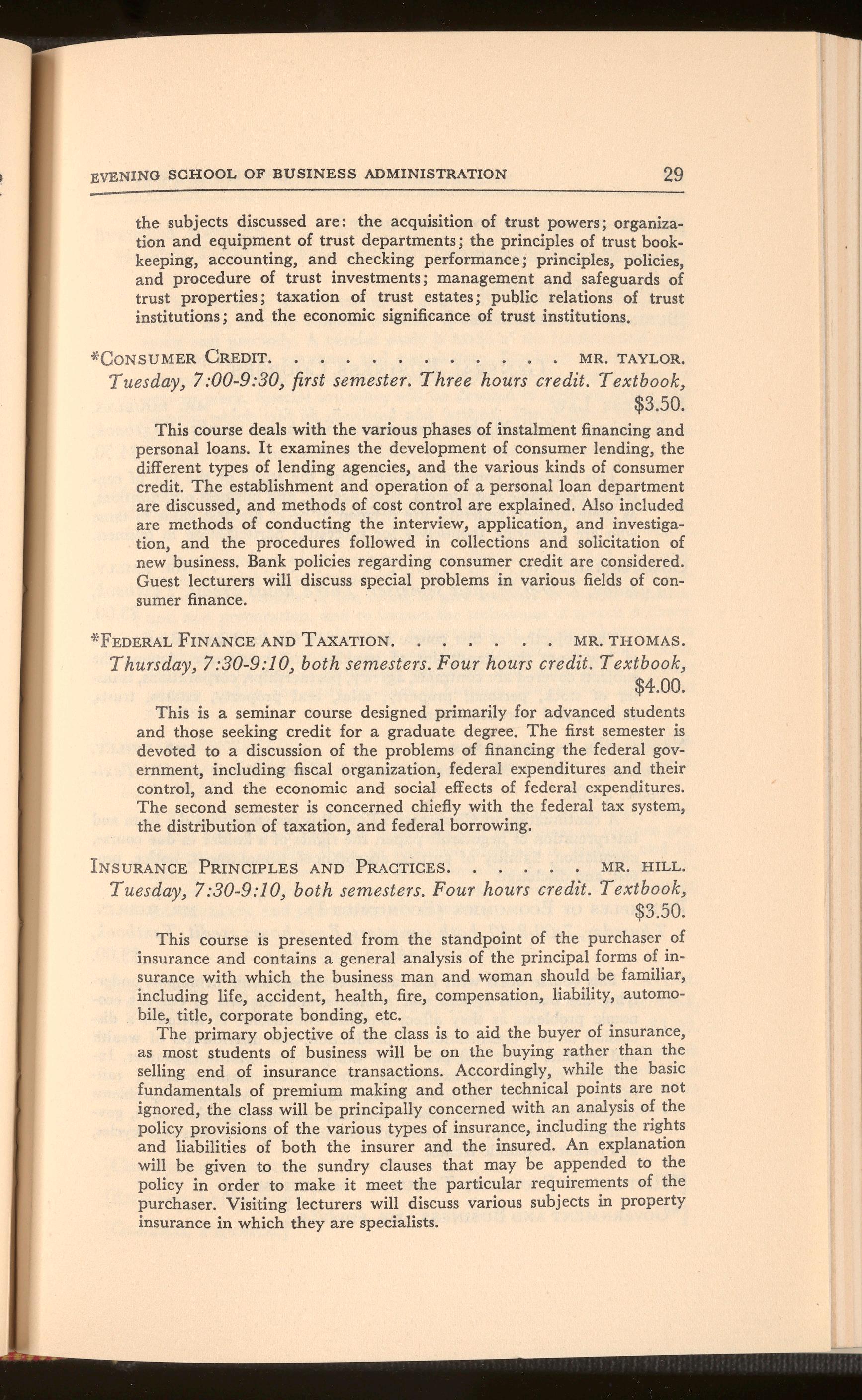
the subjects discussed are: the acquisition of trust powers; organization and equipment of trust departments; the principles of trust bookkeeping, accounting, an~ checking performance; principles, policies, and procedure of trust mvestments; management and safeguards of trust properties; taxation of trust estates; public relations of trust institutions; and the economic significance of trust institutions.
*C ONSUMER CREDIT.
MR. TAYLOR. Tuesday, 7:00-9:30, first semester. Three hours credit. Textbook, $3.50.
This course deals with the various phases of instalment financing and personal loans. It examines the development of consumer lending, the different types of lending agencies, and the various kinds of consumer credit. The establishment and operation of a personal loan department are discussed, and methods of cost control are explained. Also included are methods of conducting the interview, application, and investigation, and the procedures followed in collections and solicitation of new business. Bank policies regarding consumer credit are considered. Guest lecturers will discuss special problems in various fields of consumer finance.
*F EDERAL FINANCE AND TAXATION.
MR. THOMAS. Thursday, 7 :30-9: 10, both semesters. Four hours credit. Textbook, $4.00.
This is a seminar course designed primarily for advanced students and those seeking credit for a graduate degree. The first semester is devoted to a discussion of the problems of financing the federal government, including fiscal organization, federal expenditures and their control, and the economic and social effects of federal expenditures. The second semester is concerned chiefly with the federal tax system, the distribution of taxation, and federal borrowing.
INSU RANCE PRINCIPLES AND PRACTICES.
MR. HILL . Tuesday, 7:30-9:10, both semesters. Four hours credit. Textbook, $3 50.
This course is presented from the standpoint of the purchas er of insurance and contains a general analysis of the principal forms of insurance with which the business man and woman should be familiar, including life, accident, health, fire, compensation, liability, automobile, title, corporate bonding, etc.
The primary objective of the class is to aid the buyer of insurance, as most students of business will be on the buying rather than the selling end of insurance transactions. Accordingly, while the basic fundamentals of premium making and other technical points are not ignored, the class will be principally concerned with an analysis of the policy provisions of the various types of insurance, including the rights and liabilities of both the insurer and the insured. An explanation will be given to the sundry clauses that may be appended to the policy in order to make it meet the particular requirements of the purchaser. Visiting lecturers will discuss various subjects in property insurance in which they are specialists.
30
[CREDIT ADMINISTRATION. MR. DAVIS.]
[Hmm MORTGAGE LENDING.]
[BUSINESS STATISTICS.]
[BUSINESS MATHEMATICS.]
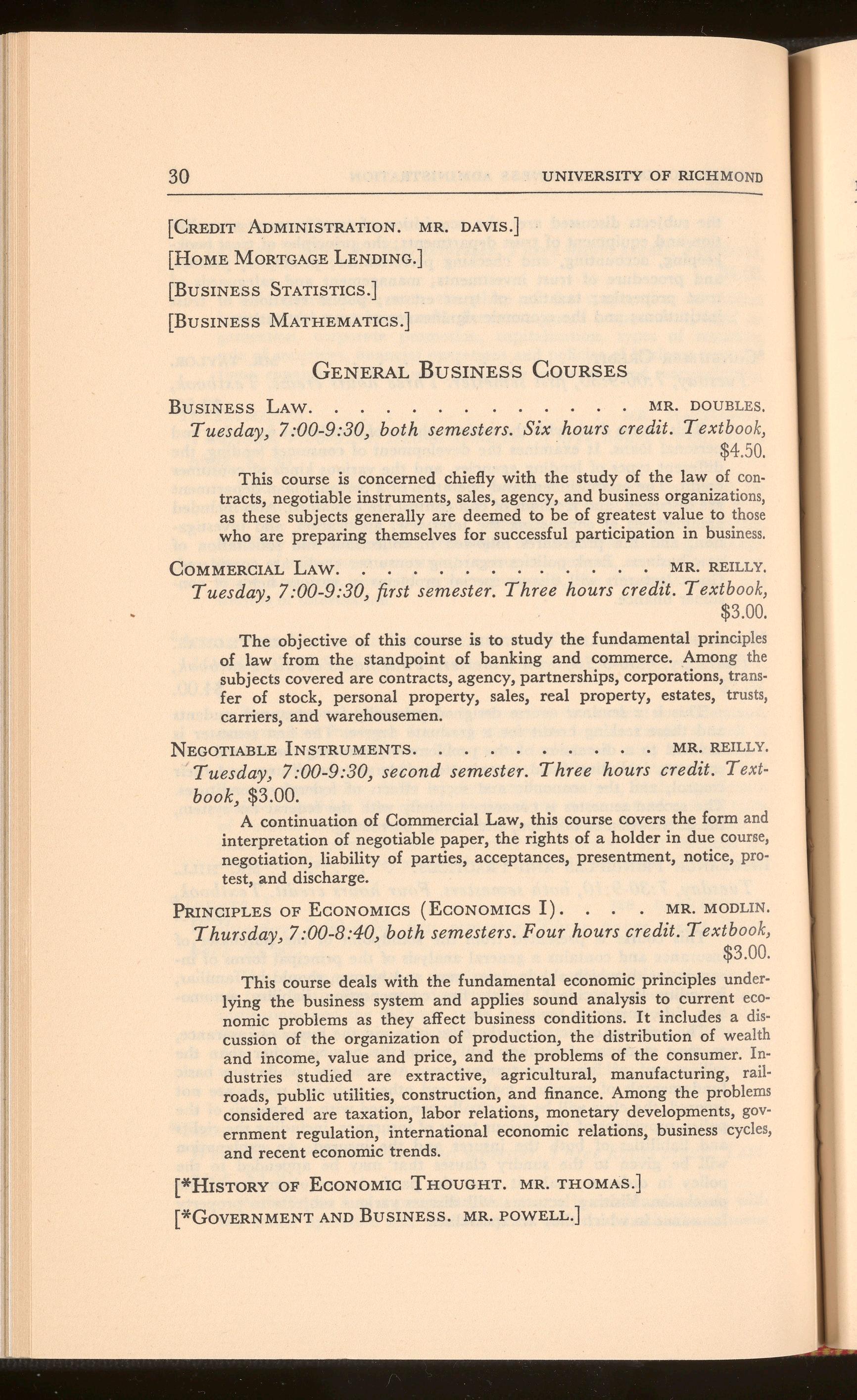
UNIVERSITY OF RICHM OND
BUSINESS LAW.
Tuesday, 7 :00-9:30, both semesters. Six hours
MR. DO UBLES. credit. Textb ook, $4.50.
This course is concerned chiefly with the study of the law of contracts, negotiable instruments, sales, agency, and business organizat ions, as these subjects generally are deemed to be of greatest value to those who are preparing themselves for successful participation in bu siness.
COMMERCIAL LAW.
MR. REI LLY. Tuesday, 7:00-9:30, first semester. Three hours credit . Textb ook, $3.00.
The objective of this course is to study the fundamental princi ples of Jaw from the standpoint of banking and commerce. Among the subjects covered are contracts, agency, partnerships, corporations, transfer of stock, personal property, sales, real property, estates, tru sts, carriers, and warehousemen.
NEGOTIABLE INSTRUMENTS.
Tuesday, 7 :00-9:30, second semester. book, $3.00.
MR. REIL LY. Three hours credit. Text-
A continuation of Commercial Law, this course covers the form and interpretation of negotiable paper, the rights of a holder in due cou rse, negotiation, liability of parties, acceptances, presentment, notice, protest, and discharge.
PRINCIPLES OF ECONOMICS (ECONOMICS J).
MR. MOD LIN. Thursday, 7:00-8 :40, both semesters. Four hours credit. Textb ook, $3.00.
This course deals with the fundamental economic principles und erlying the business system and applies sound analysis to current economic problems as they affect business conditions It includes a discussion of the organization of production, the distribution of wealth and income, value and price, and the problems of the consumer. Industries studied are extractive, agricultural, manufacturing, railroads, public utilities, construction, and finance. Among the proble ms considered are taxation, labor relations, monetary developments, government regulation, international economic relations, business cycles, and recent economic trends .
[*HISTORY OF ECONOMIC THOUGHT. MR THOMAS.]
[*GOVERNMENT AND BUSINESS. MR. POWELL.]
BUSINESS ENGLISH
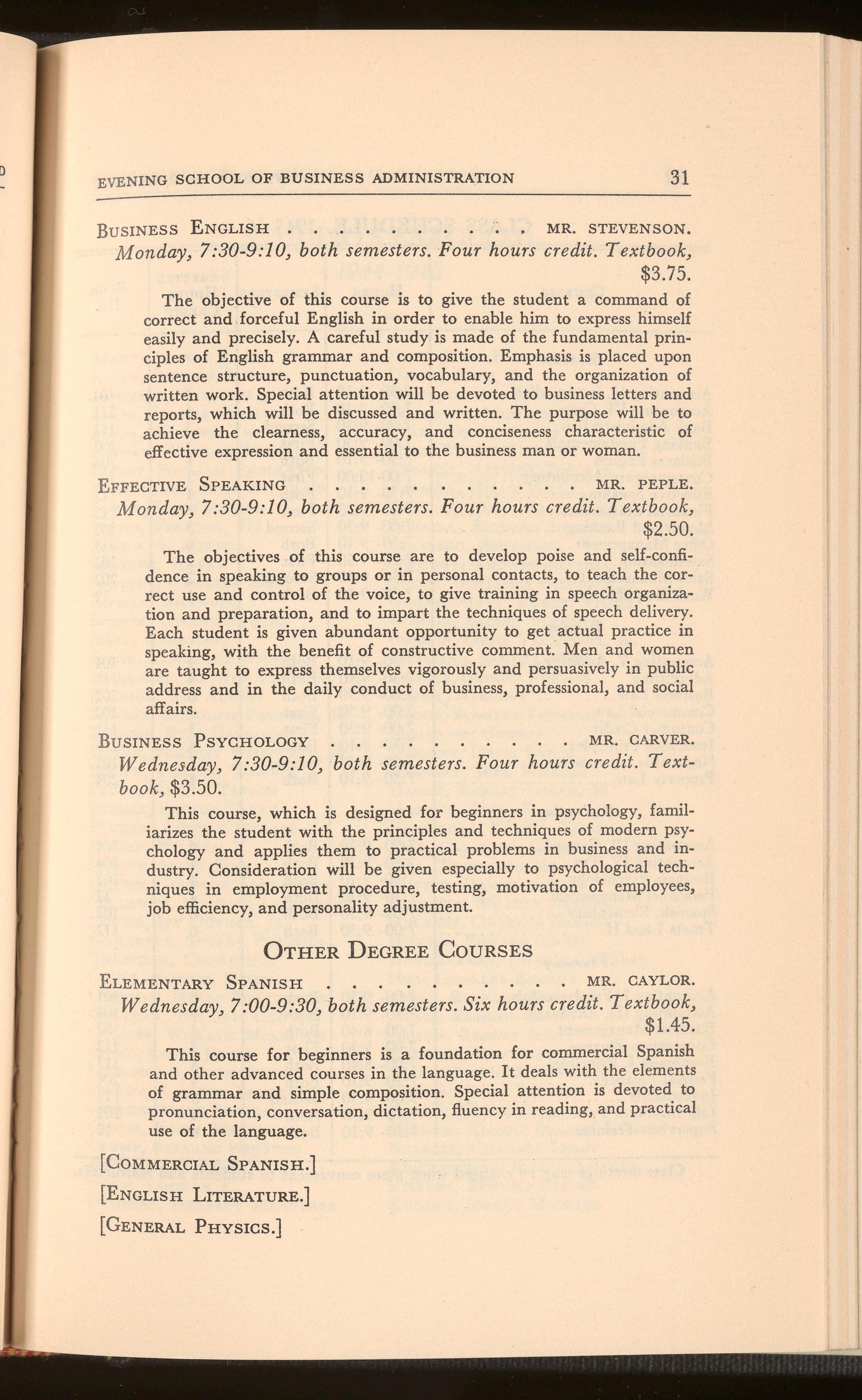
MR. STEVENSON.
Monday, 7:30-9:10, both semesters. Four hours credit. Textbook, $3.75.
The objective of this course is to give the student a command of correct and .forceful English in order to enable him to express himself easily and precisely. A careful study is made of the fundamental principles of English grammar and composition. Emphasis is placed upon sentence structure, punctuation, vocabulary, and the organization of written work. Special attention will be devoted to business letters and reports, which will be discussed and written. The purpose will be to achieve the clearness, accuracy, and conciseness characteristic of effective expression and essential to the business man or woman.
MR. PEPLE.
EFFECT IVE SPEAKING
Monday, 7:30-9:10, both semesters. Four hours credit. Textbook, $2.50.
The objectives of this course are to develop poise and self-confidence in speaking to groups or in personal contacts, to teach the correct use and control of the voice, to give training in speech organization and preparation, and to impart the techniques of speech delivery . Each student is given abundant opportunity to get actual practice in speaking, with the benefit of constructive comment. Men and women are taught to express themselves vigorously and persuasively in public address and in the daily conduct of business, professional, and social affairs.
BUSIN ESS PSYCHOLOGY
Wednes-day, 7:30-9:10, both book, $3.50.
MR. CARVER. semesters. Four hours credit. Text-
This course, which is designed for beginners in psychology, familiarizes the student with the principles and techniques of modern psychology and applies them to practical problems in business and industry. Consideration will be given especially to psychological techniques in employment procedure, testing, motivation of employees, job efficiency, and personality adjustment.
ELEM ENTARY SPANISH
MR. CAYLOR.
Wednesday, 7:00-9:30, both semesters. Six hours credit. Textbook, $1.45.
This course for beginners is a foundation for commercial Spanish and other advanced courses in the language. It deals with the elements of grammar and simple composition . Special attention is devoted to pronunciation, conversation, dictation, fluency in reading, and practical use of the language.
[COMMERCIAL SPANISH.]
[ENGLISH LITERATURE.]
[GENERAL PHYSICS.]
Class
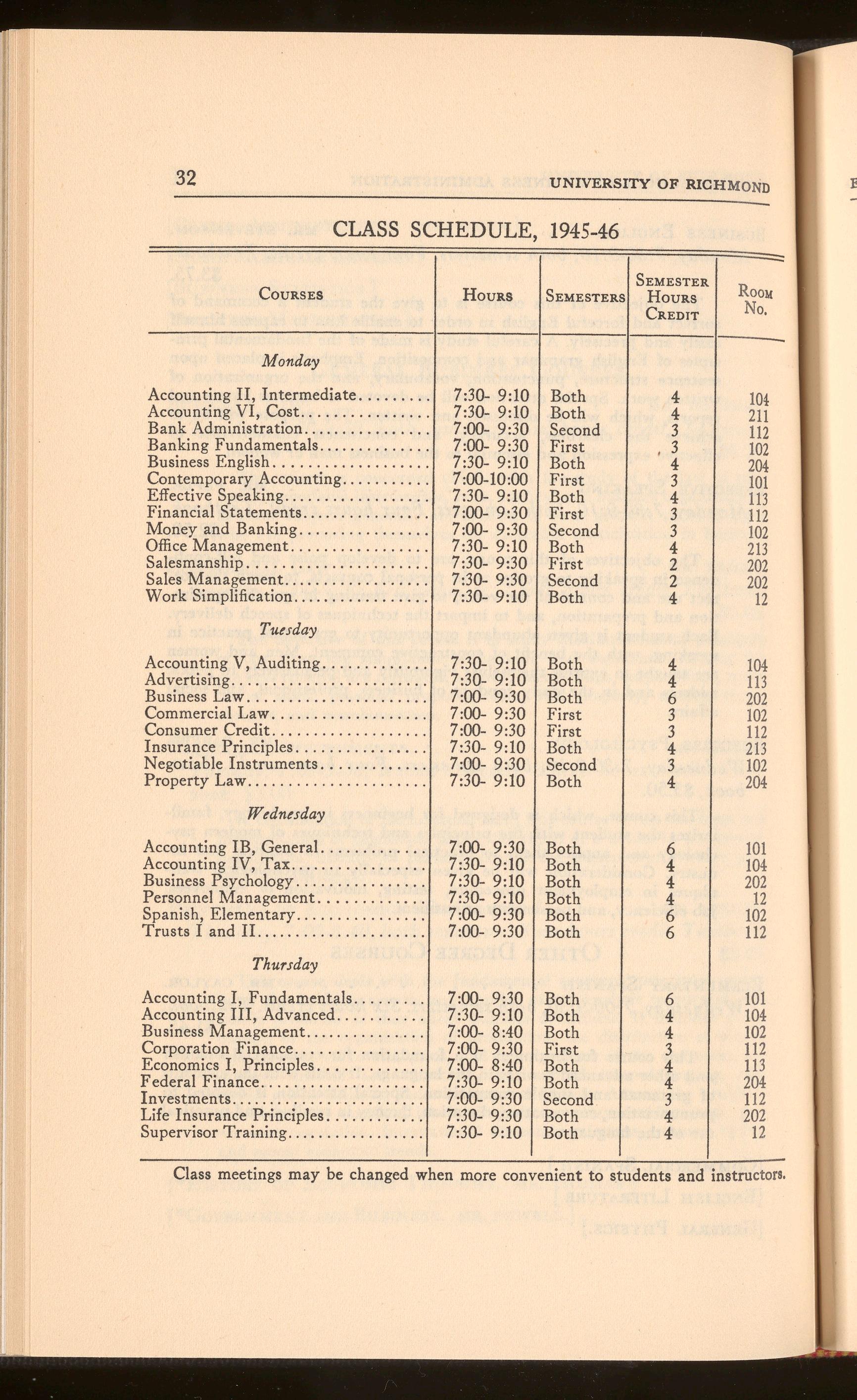
and instru ctors,
ALLEN , ALBERT EARL
ALLEN, PATRICK HAROLD
ARMITA GE, MARJORIE JUNE
BAKER, JEROME BERNARD
BANDY , WILLARD THEODORE
BANNA N, WILLIAM ROBERT
BARRE T , WILLIAM PENDLETON
BAYLISS, FREDERICK ST. CLAIR
BEIRNE , EDITH REGINA
BELVIN , PRESTON, III
BEMISS, S MERRILL
BENED EK, HENRY
BENTLE Y, CHARLES EMIL
BERMA N, EMANUEL
BETHE L , GWENDOLYN A. Brnos, GENEVIEVE
BLACK, LAWRENCE WILSON
BLAKE SLEE, ARTHUR LEOPOLD, JR.
BLANT ON , BENALBERT
BOWER S, RUDOLPH PRESTON, JR.
BREEDE N, BYRD HARRISON
BROWN , FORREST WHITFIELD, JR.
BROWN, THERON TOWNER
BRUCE , WALTER TAYLOR
BRYS O N , GEORGE TARRY
BUCKE R , AUGUST EDWARD
BULI O N , WILLIAM N.
BUNG ER, MARY JANE
CALDE R, CAMERON ALEXANDER
CALLA HAN, M AURICE LEBOSQUET
CARTE R , IvY DUFNER, JR.
CHILD RESS, STUART PRESTON
CHRIS TIAN, CONSTANCE
CLAR K , SAMUEL SMITH
COLE MAN, HELEN FORSTMANN
COLE MAN , WILLIAM CONWAY
COLLI NS, WILLIAM MEREDITH
C o Rs o, Louis JAMES
COU LBOURN, JOHN IRVIN
COZA RT, KARLENE ELYSABETH
CREE CH, MARY ROSALIE
CREW S, EDITH MARIE
CRU MP, BERNARD WINSTON
DAVI S , J. WATKINS
DAVI S, LUCILLE F.
DEL ANEY, HERBERT MANVERSE
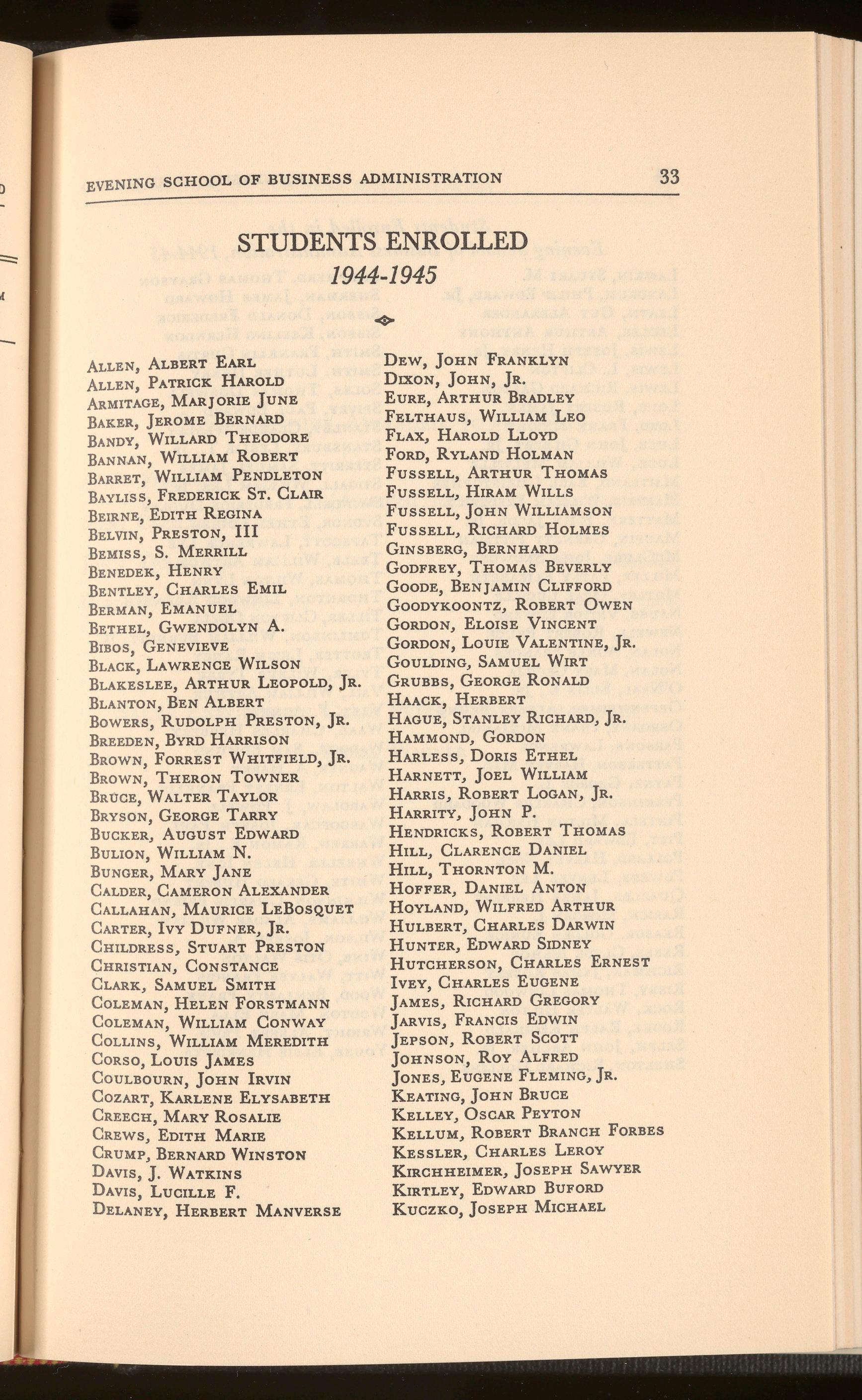
DEW, JOHN FRANKLYN DIXON, JOHN, JR.
EURE, ARTHUR BRADLEY FELTHAUS, WILLIAM LEO FLAX, HAROLD LLOYD FORD, RYLAND HOLMAN
FUSSELL, ARTHUR THOMAS FUSSELL, HIRAM WILLS FUSSELL, JOHN WILLIAMSON FUSSELL, RICHARD HOLMES GINSBERG, BERNHARD GODFREY, THOMAS BEVERLY
GOODE, BENJAMIN CLIFFORD
GooDYKOONTZ, ROBERT OWEN GORDON, ELOISE VINCENT GORDON, LOUIE VALENTINE, JR.
GOULDING, SAMUEL WIRT
GRUBBS, GEORGE RONALD
HAACK, HERBERT
HAGUE, STANLEY RICHARD, JR. HAMMOND, GORDON
HARLESS, DORIS ETHEL
HARNETT, JOEL WILLIAM
HARRIS, ROBERT LOGAN, JR. HARRITY, JOHN P. HENDRICKS, ROBERT THOMAS HILL, CLARENCE DANIEL HILL, THORNTON M HOFFER, DANIEL ANTON
HOYLAND, WILFRED ARTHUR HULBERT, CHARLES DARWIN HUNTER, EDWARD SIDNEY
HUTCHERSON, CHARLES ERNEST IVEY, CHARLES EUGENE
JAMES, RICHARD GREGORY
JARVIS, FRANCIS EDWIN
JEPSON, ROBERT SCOTT
JOHNSON, RoY ALFRED
JONES, EUGENE FLEMING, JR
KEATING, JOHN BRUCE
KELLEY, OSCAR PEYTON
KELLUM, ROBERT BRANCH FORBES
KESSLER, CHARLES LEROY
KIRCHHEIMER, JOSEPH SAWYER
KIRTLEY, EDWARD BUFORD
KuczKo, JosEPH MICHAEL
UNIVERSITY OF RICHMOND
Students Enrolled in the Evening School of Business Administration, 1944-45
LAMKIN, STUART M.
LANDRUM, PHILIP EDWARD, JR.
LEATH, GuY ALEXANDER
LEGLER, ARTHUR ANTHONY
LEWIS, JOSEPH HENRY, JR.
LEWIS, L. CLIFTON
LEWIS, RICHARD GASTON
LONG, ROBERT JAMES
LORD, FRANK KNIGHT
LucE, JoHN GILBERT, JR.
LUCK, WILLIAM MELVILLE
MAITLAND, EARL CHRISTOPHER
MALDEIS, WILLIAM FREDERICK
MATTERN, JOHN JACOB, JR.
MAUPIN, GARNETT PITTMAN
McCLURE, JoHN SNOWDEN
MILLER, PATSY ELIZABETH
MOTLEY, OPAL LUCILLE
NAUSS, VICTOR EDWARD
NEWELL, ROBERT BRUCE
NOLAN, AGNES FRANCES
NOLAN, MARY CECILIA
O'NEAL, ELLIS E., JR.
OPPENHEIMER, ALBERT BRUNO
OSBORNE, FRANK McDANIEL
PARSONS, LAWRENCE
PATTERSON, HARVEY MAC
PAYNE, GEORGE L.
PERKINSON, CHARLES WOODARD
PINTELL, MILTON HERMAN
PITT, EDWARD LEE
POLLARD, HARVEY NOEL
POWERS, LENVEL LEE
QUARLES, JAMES HERBERT
RARICK, MORGAN J.
REASOR, GOLDEN EUNICE
REESE, CLYDE BISHOP
RICHMAN, JAMES ROBERT
RISBY, THOMAS LINWOOD
RocK, WALTER HILTON
ROOKE, RALPH REGINALD
SELPH, JOHN ARCHER, JR.
SHELTON, RICHARD HOLLINS

SHEPHERD, THOMAS GRAYSON
SHERMAN, JAMES HOWARD
SISSON, DONALD FREDERICK
SISSON, KEELING HERNDON
SMITH, FRANKLIN CURTIS
SMITH, LUTHER HENRY
SOLES, THOMAS DOSWELL
SPIVEY, PAUL EDWARD
STANLEY, CLAUDE WESLEY
STANSBURY, LESLIE T., JR,
STERRITT, SAMUEL JAMES
STIGALL, WILLIAM LEE, JR.
SWINDELL, FREDERICK DUDLEY
SYDNOR, ETHEL LOUISE
TAPSCOTT, LAWRENCE LEE
TEELE, WILLIAM ARTHUR
THOMAS, WILTON LYNN
THORNTON, LINWOOD KENNETH
TILLER, CLIFTON ODELL
TOMLINSON, WILLIAM BURNETT, JR.
TROTTER, LEIGH RANEY
TYLER, WILBUR TYREE
VAIL, WILLIAM ARTHUR
VEST, F. AGNEW
WAAL, CHARLES HERBERT
WADDILL, SAM EDMUND
WAGNER, A. HARRY
WALTON, ERNEST FRANKLIN
WARDLAW, J. POWELL
WARGOFCAK, JOSEPH PAUL
WARREN, RAMON E., JR.
WHEELER, HELEN IONE
WHITE, GERALD HUBERT
WILKINSON, CHARLIE FRIEND
WILLIAMS, ALADAR WILLIAM
WILSON, JOSEPH A.
WINE, OTIS WALTON
WITT, WALTER FRANCIS
WooD, BENJAMIN FRANK
WOOTON, MARY ELLA
WRIGHT, ALBERT PRICE
YousE, ELSIE HENRIETTA
SCHOLARSHIPS AWARDED, JUNE 1945
AGNES F RANCES NOLAN } (Awarded jointly)
MARY C ECILIA NOLAN
JoHN D rxoN, JR.
DORIS ETH E L HARLESS Accounting I Business En glish Business Law

SAL ES EXECUTIVES CLUB PRIZE IN SALESMANSHIP
A. HARRY w AGNER
